Old Gold&Black
“Covers the campus like the magnolia s ”

“Covers the campus like the magnolia s ”
Voting for the 10 candidates running for Student Government Executive positions opened on April 8
ELLA KLEIN Editor-in-Chief
On Wednesday, April 9, the election results for the 2025-26 Student Government executive board were announced.
Except one. A singular candidate must receive at least 50 percent of the vote to win any position. Due to the competitive nature of the Student Body President position, the election is headed to a run-off between candidates Amaya Williams and Hanna Shakarov. Voting in the run-off election will open Thursday, April 10, at noon.
The rest of the executive team, however, was announced. Sophia Sanders is the newly elected Speaker of the House, Cole Bray won the ballot for Treasurer and Tille Gavitt was elected as secretary.
There were 10 candidates up for election for the student government's four executive positions. This year's competition is stiff, especially for Student Body President. Unlike last year, when the only candidate, Hannah Elluru, ran uncontested, four candidates are in the running this year.
It is certainly a unique election. Four candidates are running under one platform called “The Quad,” composed of Hanna Sharkov for Student Body President, Sophia Sanders for Speaker of the House, Cole Bray for Treasurer and Tille Gavitt for Secretary. The Quad is running under a shared platform, saying they “aim to enhance community, transparency, and opportunity at Wake Forest.”
Besides the run-off, three of ‘The Quad’ have been elected to Student Government.
In individual interviews with the Old Gold & Black, each candidate in ‘The Quad’ advocated for permanent QR codes and public forums to encourage constituent feedback. According to their joint Instagram posts, they shared their three collective goals: community, transparency and opportunity. They said they aspire to empower other student organizations, increase communication and improve the future paths of students.
A comprehensive account of our endorsements and each candidate's platform pitch and video can be found on wfuogb. com.
Shakarov and Amaya Williams are the
DESK paints a new learning space
Page Four
candidates in the running for Stu dent Body President.
Shakarov is a rising junior with two years of experi ence in Student Govern ment under her belt — and is one of four candidates running under the combined platform of ‘the Quad,’ as described.
Shakarov focused much of her campaign on the inefficiencies within Student Government.
“SG’s methodology of addressing student concerns is lengthy and inefficient, relying on students to find a senator, convey their con cern — all for the chance that it might be reflected in the next senate session. As a result, constituent concerns slip under the radar, and SG fails in its mission to adequately represent student interests.” Shakrov said in a statement for the Old Gold & Black.

having previous involvement in Student Government, did not garner enough votes to be put in the runoff.
JANE COHEN Contributing Writer
To conclude the Face to Face Speaker Forum of the 2024-2025 season, the Wake Forest community welcomed acclaimed musician and EGOT winner John Legend on April 8. Winston-Salem locals, Wake Forest students, Forsyth County high schoolers and college students from across North Carolina gathered in the Lawrence Joel Veterans Memorial Coliseum (LJVM) to hear Legend speak on everything from judging strategies on “The Voice” to his social activism efforts in combating mass incarceration.
Legend was interviewed by broadcast and entertainment journalist Segun Oduolowu, who hosted the Boston Globe Today and has interviewed several celebrities on entertainment, news and sports. Oduolowu shared his excitement about his conversation with Legend.
“All of those awards are for a singular human being who also writes fantastic music, is a father and is one of the judges on ‘The Voice,’” Oduolowu said. “From my point of view, it would be a no-brainer to have a face-to-face one-on-one with this incredible figure.”
In her interview with the Old Gold & Black, Shakarov was confident and laid out clear goals, as outlined in her candidate pitch, which can be found at wfuogb. com.
Williams, who the Old Gold & Black endorsed on Tuesday, is a rising senior who has served in Student Government for the last three years. Williams calls her platform G.R.O.W — Grounded leadership, representation, opportunity and wellness.
“I view the Student Government elections and campaigning as my opportunity to let the student body know everything that I have planned and am passionate about seeing happen on this campus before it is time for me to graduate,” Williams said in her statement to the Old Gold & Black.
In her interview, Williams was passionate and laid out clear goals, again outlined in the platform pitches.
Salvatore Cascio, a rising senior who has served on Student Government for three years, and Blake Shore, a rising senior who ran his platform based on not
Town Hall puts spotlight on Trump Page Six
At the time of publication, the results of the runoff had not been made publicly available.
Sophia Sanders won the election for Speaker of the House. The Old Gold & Black endorsed Sanders on Tuesday, believing her to be a capable and qualified candidate.
Sanders, a rising sophomore, is also part of ‘The Quad’ and ran her campaign on the basis of creating stronger connections and communications across campus.
“My campaign is built on a commitment to increasing engagement with the broader Winston-Salem community, improving the academic experience and streamlining communication methods between students, organizations, and Student Government,” Sanders said, in a statement to the Old Gold & Black.
Kat Dobrosky, who is also a rising sophomore, was the other candidate running for treasurer.
Oduolowu began the conversation by asking how Legend found his voice.
“I started singing in the church choir and any opportunity that I would get to sing, I wanted to make the most of it,” Legend said. “With artists that grew up singing in the church, you’ll get told by your pastor and by the folks around you, ‘don’t go singing for the devil. Don’t go singing for the world.’”
While the singer received some pushback in pursuing a career in the music industry, Legend praised the moral foundation the church gave him.
“You can lose yourself in this business and you do need to be mindful of that, but I think they gave me a good foundation to remember who I was and where I came from,” Legend said.
The conversation continued as Oduolowu asked the singer if he always knew he would live up to the stage name of “Legend,” which was initially a nickname given by J. Ivy, an old colleague and friend. Ivy was impressed by Legend’s ability to sing, write and play the piano.
This column represents the views of the deputy editor and managing editor of the Old Gold & Black, Skyler Villamar-Jones and Andrew Braun
This year’s Student Government election was dense with information. For four executive positions — President, Speaker of the House, Secretary and Treasurer — 10 candidates ran individual campaigns and shared their unique goals for the future of Wake Forest. It is undoubtedly important to vote for the Student Government executive team. It is important to follow each candidate’s campaign to make an informed decision. However, the Old Gold & Black recognizes it is time-consuming and intimidating to understand the platform of each candidate. To ease
this, the Old Gold & Black publishes an annual endorsement for each executive position.
Ahead of the elections, the Old Gold & Black’s executive board sat down with all 10 candidates. During each interview, we made an effort to understand each candidate’s unique experiences, perspectives and goals for improving different areas of campus. Through this process, our team gained a deeper appreciation for the real potential that our leaders in Student Government have to create positive change.
The Old Gold & Black’s purpose in
this election was two-fold: first, provide students — the voters — with an opportunity to hear from and get to know their candidates. To do this, we published pitches from each candidate on our website and social media for the student body to reflect on when making their own informed decision.
The second was to endorse the candidates whom our executive committee determined would be best equipped to take on the tasks of their respective positions. Asking each candidate the same questions, our executive committee factored in each individual's leadership
THE STUDENT NEWSPAPER OF WAKE FOREST UNIVERSITY SINCE 1916
ELLA KLEIN
EDITOR-IN-CHIEF kleiek22@wfu.edu
ANDREW BRAUN MANAGING EDITOR brauar23@wfu.edu
>> NEWS
Maria Silveira, silvmt23@wfu.edu
Caroline Khalaf, khalca23@wfu.edu
>> CITY & STATE
Nick Costantino, costnp24@wfu.edu
>> FEATURES
Alexandra Meier, meieam22@wfu.edu
Miriam Fabrycky, fabrml24@wfu.edu
>> ENVIRONMENT
Beza Zelalem, zelam22@wfu.edu
Asst. Editor
Reese Lile, lilerl24@wfu.edu
>> OPINION
Mattie Stillerman, stilmk23@wfu.edu
Asst. editor
Towne Moores, moortv24@wfu.edu
>> SPORTS
Sean Kennedy, kennsm21@wfu.edu Asst. editor
Blake Robison, robiba24@wfu.edu
>> ARTS & CULTURE
Lydia Derris, derrlf23@wfu.edu
Grace Schuringa, schugh24@wfu.edu
SKYLER VILLAMAR-JONES
DEPUTY EDITOR villsc22@wfu.edu
>> PHOTO
Piper Saunders, saunpg23@wfu.edu
>> VIDEO Jack Perez, perejw22@wfu.edu
>> SOCIAL MEDIA
Sophie Chan, chansr23@wfu.edu
>> COPY CHIEF
Alex Keating, keatam23@wfu.edu
>> WEBMASTER
Audrey Howley, howlam23@wfu.edu
>> DESIGN CHIEF Oliver Hale, haleop21@wfu.edu
>> ADVERTISING DIRECTOR Jordan Rill, rillje22@wfu.edu
>> ADVISER
Phoebe Zerwick, zerwicp@wfu.edu
Want to write for us? Email wfuogb@gmail.com
experience and articulated policy goals when making our endorsements.
As journalists, our foremost loyalty remains to the public and the electorate, and providing them with all of the information that we can to foster a thriving democracy. The Old Gold & Black felt a duty to fulfill this obligation and provide candidates an opportunity to speak with their constituents.
Instead, our endorsements intended to spark important conversations about candidates that are crucial to make the most informed decisions on election day.
WILL KUNISAKI MULTIMEDIA DIRECTOR kuniwx23@wfu.edu
>> POLICIES
RYDER SOLBERG BUSINESS MANAGER solbrs23@wfu.edu
Our job as a newspaper is to be a platform for all voices, not just the ones we agree with. However, we reserve the right to reject advertisements that are vulgar, inaccurate, obscene or violate Wake Forest’s policies on nondiscrimination, diversity, equity, and inclusion as they pertain to student organizations. We will also reject any advertisements that promote illegal activities according to the state of North Carolina.
Not only do we hold our newspaper and its contents to a high standard, but we also expect that those who choose to use us as an outlet for their ideas, opinions and skill hold themselves and their content to a high ethical standard.
The Old Gold & Black is published Thursdays during the school year, except during examinations, summer and holiday periods, by Triangle Web Printing of Durham. The views expressed in all opinion pieces and advertisements contained within this publication do not necessarily reflect the opinions of the Old Gold & Black. As part of our commitment to reporting news fairly and accurately, we will not remove any previously published content online unless it is retracted. If an error in either our online or print content is brought to our attention, we will revise the originally published article with an appended correction. In order to facilitate thoughtful and appropriate debate, profane, vulgar, or inflammatory comments on our website are not allowed and will be deleted. Comments which incite violence, target individuals in a form of cyber bullying, or which promote ideas which vilify marginalized communities will be deleted, and proper authorities may be notified and involved.
>> SUBMISSIONS
The OGB welcomes submissions in the form of story tips, columns and letters to the editor. Letters to the editor should be fewer than 350 words, and columns should be around 500 words. Send yours via e-mail to kleiek22@wfu.edu the Monday before publication. We reserve the right to edit all letters for length and clarity. No anonymous letters will be printed.
>> ONLINE MEDIA
Website: wfuogb.com
Facebook: facebook.com/ogb1916
X (Twitter): @wfuogb
Instagram: @wfuogb
TikTok: @wfuogb
Sports X (Twitter): @wfuogbsports
CAROLINE KHALAF News Editor
Every year, the Face to Face Speaker Forum grows, bringing in world-class names to Wake Forest and the broader WinstonSalem community. At the end of the 202425 season, the new program was announced. The speakers for the 2025-26 season are Earvin “Magic” Johnson, Mitt Romney, Lt. Gen. H. R. McMaster and Cynthia Erivo.
In 2020, the Office of the President launched Face to Face, encouraging unifying conversations and intellectual experiences. Each season, the events cover political affairs, social justice and global issues, arts and culture, innovation and business and more.
The five speakers fit into one or more of these categories.
“I’m so pleased and honored to be a part of this program and for it to really deliver on the mission that was set out in its creation— to bring a series with world-class names to the greater community of Winston-Salem and Wake Forest campus, to catalyze unifying conversations in our community,” Executive Director of Face to Face Sue Henderson said.
Starting the season, Face to Face will welcome businessman and former basketball player Earvin “Magic” Johnson in September at LJVM Coliseum. Johnson plays a prominent role in the sports world as owner of the Washington Commanders and coowner of the Los Angeles Dodgers, Los Angeles Sparks, Los Angeles Football Club and eSports franchise Team Liquid.
The second speaker of the season is Mitt Romney, former Republican presidential nominee, U.S. senator, Governor of Massachusetts and businessman.
According to the pamphlet given after John Legend’s Face to Face event on April 8, Romney offers insights into leadership, policy and America’s most pressing challenges. He played a key role in historic bipartisan legislation on improving the nation’s physical infrastructure, emergency COVID relief, marriage equality with religious liberty protections and gun safety.
In early 2026, Lt. Gen. H.R. McMaster will take the stage in Wait Chapel. McMaster was a national security advisor from 2017 to 2018 and served as a commissioned officer in the United States Army for 34 years. He
is the Fouad and Michelle Ajami Senior Fellow at the Hoover Institution, Distinguished University Fellow at Arizona State University and lecturer at the Graduate School of Business at Stanford University. Additionally, he has authored three New York Times bestselling books and has published scores of essays, articles and book reviews on leadership, history and the future of warfare in many publications.
The season will conclude with three-time Academy Award nominee Cynthia Erivo. The actress, who stars as Elphaba in the film adaptation of “Wicked,” will speak at LJVM Coliseum. She captivates audiences while serving as a fearless voice for women and people of color and setting new standards for the arts.
Students in attendance at Legend’s event were ecstatic about next season’s lineup.
Freshman Winston Miller said he is looking forward to attending more Face to Face events during the rest of his time attending Wake Forest.
“The choir got to see the list early during an afternoon rehearsal, and our jaws were on the floor when Cynthia Erivo was an-
nounced,” Miller said. “I’m most excited to listen to General McMaster. His background is a fascinating history of service to our country.”
“When they announced the names, I was honestly very shocked because they got some very high profile individuals,” said senior Jenna Mcclelland. “It’s cool to attend a university that is willing to use so many of their resources to expose its students to societal leaders that possess strong leadership, virtuous character and purpose.”
The Face to Face speaker series continues to grow each year, bringing open conversation to Winston- Salem and the broader Triad. Henderson said she hopes the series will sustain its impact on the community.
“We’re approaching a milestone year, season five,” Henderson said. “I want it to be sustainable and to continue to deliver on our value proposition, to connect our campus and the surrounding community with these world-renowned voices of influence and change.”
Contact Caroline Khalaf at khalca23@wfu.edu

“Eventually, a bunch of our crew started calling me that and it got to the point where it became viable as a possible stage name,” Legend said.
“I knew that ‘John Legend’ was a bit presumptuous,” Legend admitted. “But I believed in myself. I believed that I’m going to make this career work and I liked the fact that this name was a bit audacious.”
Throughout the conversation, Legend reinforced the importance of believing in oneself, addressing many of the students and young professionals in the room who are just beginning their careers.
“I decided I’m not going to not take this name because I’m afraid that it is not going to work out. I’m going to take it and go out there and make it work,” Legend said.
Wake Forest sophomore and attendee Davenport Hatcher was inspired and empowered by Legend’s ability to trust himself.
“He is trying to inspire future leaders in
an academic sense. I think he is trying to inspire people to believe in themselves as he felt inspired to believe in himself from support from his family,” Hatcher said. “He had a lot of confidence and that is something we should start embracing.”
Legend also shared that his priority of being an authentic and genuine artist attracts his audience.
“I think if we continue to write songs that go deep into our humanity and that honesty of our real life experience, that’s what is going to continue to connect with people,” he said.
Along with touching on the values reflected in Legend’s music, Oduolowu couldn’t help but inquire about the singer’s EGOT credentials — a title given to someone who has won an Emmy, Grammy, Oscar and Tony award.
Legend specifically noted that the award for “Glory” in the movie, Selma, felt particularly special. The movie focused on the Selma to Montgomery marches in 1965.
“It wasn’t just any old song for any old
film,” Legend said. “This was a song about a film that commemorated the life of one of the most important activists and leaders that we’ve ever seen in this country. We wanted to do something that really honored his legacy and the struggle that is still ongoing in America.”
The singer shared that this award inspired him to found Free America, an organization that actively fights against mass incarceration and prioritizes building up impacted communities.
“We started going from state to state working with activists, seeing what their priorities were and what we could change on a state by state level,” Legend said. “It’s made a difference. Incarceration has gone down in the country since me and others started working on this issue.”
Just as Legend’s upbringing in the church is reflected in his work ethic and music, he shares that his social activism and entrepreneurial endeavors reflect his priority of authenticity.
“I believe that ethos should apply to the way we think about criminal justice and reforming our system in the sense that people deserve a shot at redemption and grace,” Legend said. “We, as a society, can learn to forgive each other and give people the opportunity to change their lives.”
Oduolowu attempted to end the conversation by deeming Legend as an embodiment of Pro Humanitate as an individual who focuses on the greater good in all of his endeavors. However, Legend interrupted to convey a final message on the priority of education.
“It’s important that our leaders, our school presidents and our universities come together and stand up for academic freedom,” Legend said. “The best way we can do that is together across party lines, across ideological lines to make sure that we protect this critical resource.”
Contact Jane Cohen at cohejl23@wfu.edu
• An unknown individual removed unsecured scooters from a breezeway near Kitchin Hall. This report was filed at 10:17 a.m. on April 2.
• An underage individual consumed alcohol at an unknown off campus location. No transport was needed. This report was filed at 12:04 a.m. on April 5.
• An unknown individual removed unsecured scooters from a breezeway near Kitchin Hall. This report was filed at 4:36 p.m. on April 5.
JILL YODER Staff Writer
Wake Forest’s annual DESK event took place on Tuesday, April 1, on Davis Field, bringing together student organizations from across campus to paint personalized desks for elementary school students in the Winston-Salem community. This year, 68 desks were painted with the help of the students and their families.
Junior Remy Cush has been involved with DESK since her freshman year, serving as community outreach chair in her sophomore year and a director for this year’s event. To her, DESK is a unique opportunity to engage directly with students in the community and support educational equity.
“It’s one of my most favorite days of the year, being able to work with local elementary school kids,” Cush said. “Being able to have an impact on someone else while also raising money and awareness for promoting educational equity through DESK is such a unique opportunity. Education is great, but not all people are given the same opportunities, so having a chance to promote educational equity and accessibility is a very unique opportunity that DESK provides.”
DESK stands for Discovering Education through Student Knowledge and was founded in 2004 when Wake Forest students noticed a lack of study spaces in the homes of students they tutored. The event began a partnership with Old Town Elementary and was later expanded to partner with four Title I elementary schools — Old Town Elementary, Cook
Literacy Model School, Kimberly Park Elementary and North Hills Elementary.
Junior Chelsea Njei is in her second year as a director for DESK and believes in the impact the event makes in creating environments that promote learning and creativity.
“DESK impacts our community by providing a space for elementary students to be creative and also be part of an event that will help promote learning,” Njei said. “I believe everyone should have the opportunity and space to advance their learning, and there’s no better way to support that than by painting a study space for the kids to be able to do so.”
Beyond the desk painting initiative, DESK also raises money for the Freedom School in the months leading up to the in-person event. The Freedom School is a program for elementary students led by Wake Forest students each summer to boost reading skills and prevent “summer slide.”
DESK fundraises for the Freedom School through a Crowdfund and further engages the student body through t-shirt sales, candygram sales and a fundraising trivia night at Campus Gas.
Along with fundraising, the in-person DESK event is meant to promote a connection between the Wake Forest student body and the Winston-Salem community. Cush commented on the importance of bridging the gap within our city.
“These people are our neighbors and I think it’s important to break outside of the walls of Wake [Forest],” Cush said. “We’re all so privileged to go to such a prestigious school and I think part of that

DESK stands for Discovering Education through Student Knowledge and was founded in 2004 when Wake Forest students noticed a lack of study spaces in the homes of students they tutored.
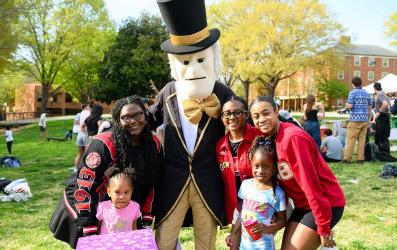
privilege is now giving back to the school and giving back to the community and getting to learn about the individuals that we live with.”
In the years since DESK’s start, the event has received impressive amounts of student interest. Campus clubs and organizations sign up to paint a DESK and then show up on painting day with energy and excitement to meet their assigned student and spend an afternoon crafting and making connections.
“There’s definitely been an increase of interest from the student organizations on campus,” Njei said. “To have this level of support is honestly amazing because it shows that many students want to show up and support the kids in the WinstonSalem community. It also shows that they are aware of the DESK initiative and what the event truly means. Without the student organizations, DESK wouldn’t be possible.”
Sophomore Katie Posnanski volunteered at the event and was inspired by the opportunity to meet the student whose learning she is hoping to impact through the project.
“I just love interacting with the kids and doing something small that will impact their whole school year,” Posnanski said. “We’re painting for Zoe and she came and started painting with us and it’s just lovely to see firsthand how one small action can mean so much.”
The DESK event often leaves an impact on Wake Forest students as well, serving as a way to engage in community service
while making memories alongside new and old friends. Junior Libby Webster volunteered at the event and shared that each year, DESK allows her time to destress through painting while supporting a good cause.
“DESK is actually my favorite philanthropy event that we do on campus,” Webster said. “I’ve found that the timing of it always aligns with when I’m really stressed and it’s relaxing to be able to just paint for a few hours for a kid and for a good cause. I also like doing it with my friends, it really brings us all together.”
DESK is a unique opportunity to engage directly in a philanthropic activity. Student volunteers commit their time and creative skills to personalize a study space for an assigned student and often work alongside the kids themselves. The event brings together Winston-Salem families and college students, creating impactful connections across differences within a shared community.
“We encourage the participating families and students to come to the school and meet the team, be hands-on and get the paint all over themselves, write their names on their desks, paint their favorite books, sports, movies and hobbies,” Cush said. “They’re able to create this desk with their own interests that they will use at home and see the fruits of their labor further in life. I think it’s a very positive and validating experience for students.”
Contact Jill Yoder at yodejs24@wfu.edu
Continued from Page 1
Treasurer
Cole Bray won the election for Treasurer. Bray, a rising junior, ran his platform based on the transparency of communication between the SBAC and the clubs receiving funding.
“ I want to simplify the funding process so students fully understand how to access financial support for their clubs. Transparency is key, and I will
push for a public ledger of major funding decisions to ensure accountability.” Bray said in a statement to the Old Gold & Black.
Although the Old Gold & Black did not endorse Bray, we believe him to be a capable and qualified candidate and wish him the best in his upcoming term.
Rising senior Juan Londoño was the other candidate running for treasurer. The Old Gold & Black endorsed Lon-
doño on Tuesday.
Secretary
Rising sophomore Tille Gavitt won the election for Treasurer. Gavitt ran her platform based on her ‘people forward’ attitude and is a part of the combined platform of ‘the Quad’
“I’m passionate about building relationships, creating impact, and ensuring every student feels valued, heard, and represented,” Gavitt said in an in-
terview with the Old Gold & Black. Although the Old Gold & Black did not endorse Gavitt, we also believe her to be a capable and qualified candidate and wish her the best in her upcoming term.
Samantha Servin, a rising senior, was the other candidate running for secretary. The Old Gold & Black endorsed Servin on Tuesday.
Contact Ella Klein at kleiek22@wfu.edu
Nick Costantino, costnp24@wfu.edu
New state laws strengthen ICE cooperation as North Carolina communities brace for impact
MALCOLM BROWN Staff Writer
President Donald Trump made numerous promises on the campaign trail, including ending the wars abroad, lowering prices and perhaps his most emphatic pledge: deporting undocumented immigrants from the United States.
Specifically, Trump said he wants to deport every single undocumented immigrant from the country – more than 11 million people – using military and law enforcement. In North Carolina, there are approximately 315,000 undocumented immigrants, with about a third living in the Charlotte metro area.
It is, therefore, no surprise that North Carolina has been a target under the Trump Administration, and the state government has been receptive thus far.
In an attempt to strengthen the relationship between state law enforcement agencies and U.S. Immigration and Customs Enforcement (ICE), the North Carolina Senate passed a bill requiring state agencies under Stein to cooperate with ICE in early March. According to ICE’s website, the agency’s mission is to be responsible for “Protect[ing] America through criminal
investigations and enforcing immigration laws to preserve national security and public safety.”
The recently passed bill includes many provisions, including mandating four state agencies to comply with ICE: the (N.C.) Department of Public Safety, the Department of Adult Correction, state highway patrol and the State Bureau of Investigation.
It also requires audits by the State Office of Budget Management to ensure undocumented immigrants are not benefitting from programs funded with state money. Additionally, it prevents North Carolina universities from implementing policies that help or protect undocumented students and allows North Carolina residents to sue cities believed to have sanctuary city policies.
Since the passage of this legislation, there have been many instances of ICE’s presence in North Carolina. In Durham, North Carolina, there was a video of ICE raids detaining three men who said they were from India, with a total of 11 people taken into custody in the Durham area by different raids.
Durham council member Steve Rao said, “It always makes you anxious when people are coming in and visiting homes and taking people into custody not knowing where they are. These are people that we've known in
our community,” in response to these raids. These raids have generated concern in many communities in the Tarheel state.
Outside the Mexican Consulate in Raleigh, unusually long lines stretched beyond the typical crowd. While the consulate is often busy, the lines grew exponentially after Trump’s recent executive orders due to people wanting to ensure that their immigration documents were in order.
“Outreach is the key word. It’s not waiting for them to call us, but us going to them,” said Sgt. Edwin Garcia of the Raleigh Police Department. Garcia is one of the Raleigh Police Department’s Spanish-speaking officers who attends to the needs of the sizable Spanish-speaking population in Raleigh.
School districts in North Carolina are grappling with the implications of these new laws as well. The Trump administration reversed the policy that kept “sensitive locations” – such as churches, schools and universities — as off limits for ICE raids.
Amid this change in policy, North Carolina school districts are still promising to keep undocumented students protected in their schools. Some school districts are telling their principals to deny ICE agents unless they have a warrant for specific individuals.

U.S. law enforcement agents stand guard at a border entry point.
As North Carolina adjusts to these sweeping immigration enforcement measures, communities continue to respond with mixed approaches. The state now finds itself at the forefront of a national debate, where new immigration policy meets the realities of daily life. How North Carolina chooses to move forward will shape not only its future but also the lives of thousands who call it home.
Contact Malcolm Brown at browmd24@wfu.edu
Thousands have 15 days to verify their identities
NICK COSTANTINO City & State Editor
On April 4, the North Carolina Court of Appeals ordered about 65,000 voters to verify their identities within 15 days of notice or have their ballots thrown out. This ruling was a win for Jefferson Griffin, the Republican candidate, who has fought for months in court to throw these ballots out. Justice Allison Riggs, his Democratic opponent, who won the election by 734 votes, has already appealed this decision to the N.C. Supreme Court, her only avenue left.
In a 2-1 ruling on the N.C. Court of Appeals, a ruling was issued in favor of Griffin, ordering the estimated 65,000 voters to verify their identities through social security or a valid driver’s license within 15 days, or the votes would be tossed out. It is unclear what this verification process will look like — and whether the affected votes are contested for every race in the 2024 election or only for the judicial race.
Recap: 65,000 ballots contested
In November 2024, Riggs won the election against Griffin, the Republican candidate, maintaining her seat on the N.C. Supreme Court. In a recount performed immediately after the election, the State
Board of Elections reaffirmed Riggs’s victory, but Griffin still pursued his lawsuit.
He sought to throw out 65,000 ballots that did not have valid identification on their registration. However, it is required to show an ID at the voting booth or through mail in the state of North Carolina. Because of this, many Democrats, including Riggs, challenged the validity of this argument.
According to Riggs, changing the laws after an election is also dangerous to the integrity of a vote. In a previous statement before the court, she underlined the harmful precedent this could set for future elections.
“Rather than suing before an election to challenge rules they do not believe are valid, candidates will have an incentive to say nothing and wait to see if they win,” Riggs said in a court document. “Then if they lose, they will drag out elections through litigation for months, seeking to throw out votes until they win.”
Republicans in August of 2024 sought to purge thousands of registrants from the voter rolls because they were improperly registered.
However, per federal law, one cannot purge voters within 90 days of an election, so this case was postponed until after the election. The race was recounted, including the contested ballots, and Riggs was declared the winner. Our previous coverage can be found online.
The court’s ruling
According to the New York Times, the Republican judges on the panel wrote in the majority opinion that the possibility of one unlawful vote “disenfranchises lawful voters.” The Democratic judge on the panel argued, however, that “changing the rules” after an election was “directly counter to law, equity, and the Constitution.”
The majority on the court ruled that “Never Residents” voters, those who have never lived in the state of North Carolina but are registered to vote here, should have their votes tossed out as well. These voters are usually the children of members of the military who are stationed overseas and who just recently turned 18. This ruling thus invalidates a 2011 law allowing “Never residents” to vote in elections.
Voters that will need to have their identities verified are required to present their IDs at the voting booth or through mail. However, Griffin has argued that since they did not verify their identity while registering to vote, their ballots are invalid. Affected voters will have 15 days to verify their identity by presenting their ID or social security at a government office or through the mail.
The election board and Riggs’s lawyers have argued that “voters should not be punished for a supposed administrative error that was not their fault.” Furthermore,
“retroactively tossing out their ballots, they argue, would amount to changing the rules after the game has been played, according to the New York Times. Conversely, the N.C. Republican party has stood by Griffin throughout this whole ordeal, even as some members have wavered.
It is difficult to know what the future will hold for this case, but Riggs has already appealed this decision to the N.C. Supreme Court, who will likely hear the case in a matter of days. Anderson Clayton, the NC Democratic Party chair, tweeted, “North Carolina Democrats WILL fight this decision.”
Riggs released a statement vowing to “stand up for the rights of voters in this state.”
NCGOP spokesperson Matt Mercer said, “for months, Judge Griffin and the NCGOP have endured baseless attacks and incendiary rhetoric in this matter. Throughout this time, our position has been consistent: when the debate is about the merits, Judge Griffin will prevail in his election integrity concerns.”
Voters should continue to stay informed on this issue, and stay up to date on the status of their ballot. A list of the contested ballots can be found online.
Contact Nick Costantino at costnp24@wfu.edu
Amid mounting concerns over government downsizing, a heated public meeting highlights growing voter discontent with Trump administration policies.
MALCOLM BROWN Staff Writer
In just 52 days since taking office, President Donald Trump has already made significant changes to the federal government. From implementing his tariff policy to Elon Musk’s role in downsizing the size of the federal government through the Department of Government Efficiency (DOGE), a lot has changed with this administration.
His 52nd day was also Thursday, March 13—the day when Rep. Chuck Edwards RN.C. hosted a public town hall with voters in Asheville, N.C. The discussion centered around the Trump administration’s actions in the Tarheel State. Voters had much to share on the subject.
Edwards’s district represents Asheville, which was hit by Hurricane Helene in late September. Many buildings and facilities in the city are still in need of repair. The North Carolina Office of State Budget and Management (NCOSBM) reported an estimated $59.6 billion in damages at the end of 2024, along with additional needs.
Edwards began the town hall by discussing western North Carolina’s recovery from Hurricane Helene, specifically by highlighting the work he said the Trump administration has been doing for the region’s recovery.
In an attempt to reassure voters of the work being done to rebuild the western part of the Tarheel State, Edwards spoke on the presi-
dent’s proposal to dissolve the Federal Emergency Management Agency (FEMA). Created in 1979, FEMA’s role is to fund recovery efforts at the state and local level and support survivors after natural disasters.
Edwards unintentionally stirred the crowd with this statement. Many voters shouted at him and demanded that he take their questions immediately. One voter even had to be escorted out of the hall after shouting expletives at the congressman.
FEMA was not the only contentious issue discussed at Edwards’s town hall. When Edwards permitted the audience to ask questions, many asked about Elon Musk’s role in the future of health care programs such as Medicare and Medicaid.
There were also concerns about layoffs at the Department of Veterans Affairs. One constituent asked, “How do you justify cuts to staff of the VA helping veterans, especially those with long-term care needs?”
This question received a standing ovation from the audience.
“We need to protest,” said Barbara St. Hilaire, a 63-year-old Asheville resident who attended the town hall. “We need to stand up for what we believe in, and what we believe in are the government agencies that support the middle class and the lower class.”
However, Edwards remained steadfast in his support of the Trump administration’s policies. He emphasized that an essential part of his role was to identify the decisions his constituents disagreed with, allowing the
federal government to “go back and look” at what improvements could be made.
This approach contrasts sharply with the strategy of some within the GOP, such as Mike Johnson, who told party representatives to skip out on town halls, arguing that protesters were professionals paid to be there. However, Edwards refused Johnson’s request, arguing that he didn’t want to “shy away” from the concerns of the people of western North Carolina—even if they disagreed with him.
Concerns voiced by constituents are not unique to North Carolina. In Wyoming, Rep. Harriet Hageman R-W.Y., who succeeded Liz Cheney, faced slightly less outrage from her constituents. This discontent was particularly related to Elon Musk and his role in DOGE, showcasing these ideas are held beyond state lines.
For communities like Wake Forest, understanding these town halls illustrates how national policies are impacting the local level, providing a clearer perspective of the environment that students and future voters are entering.
These political sentiments expressed in recent town halls are evident in recent electoral outcomes across various states. In a Pennsylvania special election last Tuesday, March 25, Democrat James Malone won the seat for Pennsylvania’s 36th Senate District, which had been held by Republicans since 1879. This district had previously gone to Trump by a margin of 15 points in 2024 and has a

A town hall hosted by Rep. Chuck Edwards in Asheville, N.C., turned chaotic after questions about Hurricane Helene, DOGE and the VA.
23-point Republican voter registration advantage. Many Democrats interpreted this win as a rebuke of Trump Administration policies, though it is important to note that decreased turnout may have favored the Democratic candidate.
During a press conference following his town hall, Edwards stated, “We’re doing exactly what the American people sent us to Washington, D.C. to do.” Only time will reveal whether voters share that sentiment. The upcoming special election in Pennsylvania may provide important insights into what the future holds, especially if voters do not agree.
Contact Malcolm Brown at browmd24@wfu.edu
Jackson kicked off Wake Forest University’s inaugural Leadership and Character in the Law Conference
ANDREW BRAUN Managing Editor
North Carolina Attorney General Jeff Jackson spoke candidly about his short time as the state’s top prosecutor. After serving just three months in statewide office, he said he does not have it all figured out and often relies on his character to show him the way.
This honesty is just one trait of leadership that Jackson shared with students and scholars at Wake Forest University’s inaugural Leadership and Character in the Law Conference. In his keynote address, Jackson provided aspiring leaders with advice for delivering meaningful change, finding their purpose, and realizing their full potential.
Jackson kicked off the symposium in Farrell Hall hosted by Wake Forest’s Program for Leadership and Character. According to the event’s website, the two-day conference on March 27 and 28 convened law scholars and students from around the country “to share common concerns as well as to develop ideas for developing lawyers of integrity.” The event also featured remarks from more state leaders, including North Carolina Supreme Court Justice Phil Berger, Jr. and former Justice Michael Morgan. Jackson, 42, brought a great wealth of leadership insight to the event. Before being elected to statewide office in 2024, he served as a Charlotte-area state senator, briefly ran a U.S. Senate campaign and was a member of Congress for one term. As a member of Congress, Jackson gained popularity on social media, surpassing 2.2 million Tik Tok
followers and another nearly seven-hundred thousand on Instagram.
However, Jackson said leading a large organization like the North Carolina Department of Justice reminds him most of his time in the U.S. Army. Like the armed forces, Jackson supports his organization’s selfless, “mission-driven” employees to help the people of North Carolina, often for little reward of their own. As a leader, he said it is important to take a step back and recognize his team’s accomplishments to avoid burnout and make sure people stay motivated.
“One of the things mission-driven people tend not to do is celebrate their wins,” Jackson said. “All of the leaders [at the justice department], we have to do a very good job of making sure we pause to celebrate.”
Jackson also said it is his job to build quality partnerships with the other people and organizations who can give his department what it needs to achieve their goals. This means constructing sincere, trustworthy relationships with local, state, and federal officials that can support their missions around North Carolina.
Caleb Pembele, president of the Wake Forest College Democrats, appreciated Jackon’s efforts to connect with local North Carolina communities.
“Attorney General Jeff Jackson’s address was insightful, and I took many lessons from it that I will use in my life,” Pembele said. “His remarks further confirmed that he is up to the task of Attorney General and will do his job ethically and effectively.”
Whether tackling the “third wave” of the
prescription drug crisis with fellow attorneys general or recruiting federal law enforcement agencies to protect Western North Carolina’s reconstruction in the wake of Hurricane Helene, he says honesty has already helped him to affect real, impactful change since taking office in January.
“I make it as easy for them to say yes as possible because that conversation [with attorneys general] is not really about fentanyl,” Jackson said. “That’s the text. The subtext is ‘Is this person trustworthy?’”
Jackson eventually leveraged the trust he built by talking to students and appealed to their character. Sitting down for a moderated question-and-answer session with Associate Dean for Experiential Learning and Director of the Medical-Legal Partnership (MLP) Clinic Allyson Gold, Jackson argued that forces like partisanship and publicity are poor incentives for public officials, who, he says, the public just want to see do the job well.
“No matter how good a job I end up doing on this, there’s a limit to the number of people who are going to follow anything that I do,” he said. “The motivation is just to do the right thing. If your motivation is ‘I want everyone to see what I’m doing all the time,’ you are going to fail.”
Jackson implored students to consider the merits of a career in public service. He explained how students could discover their personal reason or mission and make their own change in their community. He rec-
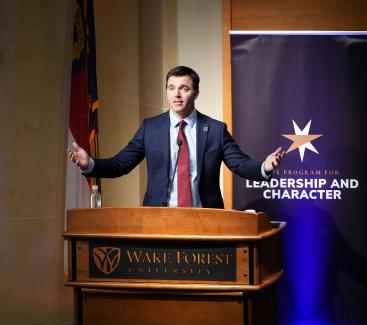
N.C.
ognized the reasons people might shy away from a career in public service – the tense political moment or bureaucracy’s lesser benefits – before asking students to reconsider if they’re embarking on their life’s path for the right reasons.
“[Young people] really want the car. They really want the house. I get that,” Jackson said. “But if you’re willing to step out of that and let your own character and your own inclination be your guide, it’s so deeply rewarding. It’s the type of decision very few people end up regretting.”
Contact
OLD GOLD & BLACK
Alexandra Meier, meieam22@wfu.edu
Miriam Fabrycky, fabrml24@wfu.edu
Trailblazing alumna Camille Love reflects on her values, careers and passions
PAPPAS Video Contributor
When Camille Russel Love enrolled at Wake Forest University fifty-four years ago, she never foresaw how her future would unfold. From making history as one of the first Black female students at Wake Forest to a storied career ranging from business to the arts to public service, Love has left a trail of accomplishment in her wake.
In her endeavors, Love has woven together two distinct dynamics: she is disciplined, precise and analytical — yet also joyful, free-spirited and unapologetically daring. These traits stand strong in their own right, yet together, they form the foundation of Love’s outlook on life.
The early years
Raised in Winston-Salem, N.C., Love grew up surrounded by a spirit of ambition and service. She found a role model in her father, entrepreneur, teacher, local politician, and social activist Carl H. Russel Sr., a Renaissance man dedicated to many causes. Russel taught his daughter the importance of working hard to give back to one’s community.
“Let the work I’ve done speak for me,” Russel would often say. “Let what I have done be my legacy.”
Love took her father’s message to heart. She displayed academic promise from a young age and broke through the constraints of segregated schooling to take AP Chemistry at the then all-white R. J. Reynolds High School. Outscoring her classmates on each exam, Love quickly demonstrated to her peers and teachers that Black students could compete with their white counterparts. Love succeeded in all her classes, but her most impressive performances were in the hard sciences.
“I learned that I was just as smart as [the other students], especially in things that were black and white,” she said. “The numbers computed, or they didn’t.”
Life as a Demon Deacon
Love enrolled at Wake Forest University in 1970 with financial support from Anne Reynolds Forsyth and Frank Forsyth, local philanthropists and advocates for racial equality whom her father knew well. Though Love faced challenges in college, she cherished her time at Wake Forest because of the institution’s vast opportunities for learning.
Love viewed her time at Wake Forest as a job. Not only did she aim to gain an education, but she also wanted to prove to the academic community that Black students could compete and contribute to the university. This “labor of love,” echoing her father’s sentiment that all work is good work, motivated her stellar academic performance.
Love’s close relationship with then-president James R. Scales often thrust her into a position of advocacy for other Black students. When a professor unfairly graded the writing assignments of Black students, Love collected proof and presented it to President Scales. When two Black football players were accused of cheating, she argued in front of the academic discipline committee to prove their innocence.
Discipline, analytics, and the courage to change
Love’s analytical skills and academic diligence made her a prime contender for a law career. She attended the Duke University School of Law after graduating from Wake Forest. At Duke, however, Love did not find the
satisfaction she sought, and she considered leaving multiple times during her first year. When a truck rolled through her apartment a few months after she arrived at Duke, Love considered it a sign — it was time to change course. After leaving Duke, Love worked multiple jobs in the corporate world: first at Southern Bell, then at IBM, where she stayed for fifteen years as the first Black woman in the South to work as a manager of large system computers.
Love often sold computers to leaders in the insurance and utilities industries who hesitated to take industry advice from a Black woman. From those experiences, she learned that the key to confidence lies in remembering one’s authority.
“You just have to not give a damn about other people’s opinions,” Love said. “They are not walking in your shoes. They did not reach where you are by the same path. So how dare they judge you?”
Although Love enjoyed applying her analytical skills within her role, one of her favorite parts of her career at IBM was the opportunity to travel frequently. She enjoyed exploring different cultures in each city she visited and was especially intrigued to learn more about art.
Love took a leave of absence from IBM in 1987 to work as a loaned executive for the newly-minted National Blacks Arts Festival in Atlanta. Her time at the festival filled the gaps left by her education at Wake Forest, which wouldn’t launch its African American studies program for another 34 years.
When IBM announced its first downsizing in 1988, she sprung at the opportunity to take an optional severance package and permanently change course to pursue a career as an art entrepreneur.
“I don’t fear change or the unknown because [life] has to be an exciting adventure,” Love said. “You need to be flexible and willing to take chances. If you’re committed to it, something’s going to work out.”
Love applied the marketing expertise she had developed at IBM to publish several successful lines of fine art prints. Demand for her business grew consistently, and Love raced to respond by expanding into printing original artworks and eventually opening a gallery of her own.
“I don’t fear change or the unknown because [life] has to be an exciting adventure. You need to be flexible and willing to take chances. If you are committed to it, something’s going to work out.
After Love’s gallery became a commercial success, the then-mayor of Atlanta asked Love to direct the Office of Cultural Affairs in 1998. Excited by the opportunity to democratize access to the arts in Atlanta, she decided to accept the role. To counteract perceptions of elitism, Love collaborated with major Atlanta arts institutions to diversify their boards, programming and audiences.
Love’s career in the arts was a perfect synthesis of the two halves of her personality — the precise and the creative, the diligent and the free. Every project with the
2025
city required strict administration of budgets, deadlines and attention to stakeholders. Yet, the office as a whole
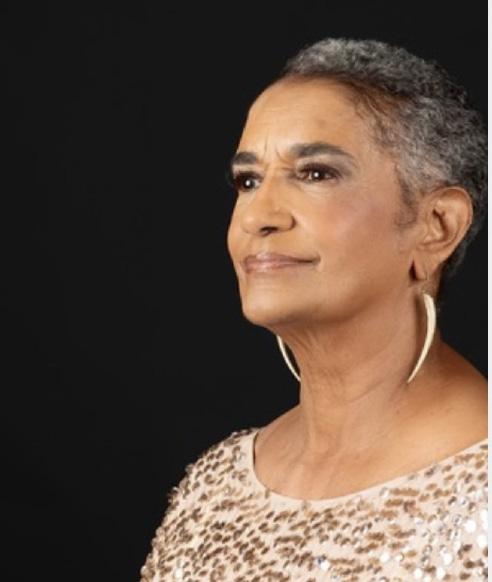
Alumna Camille Love has made a mark in business, the arts, public and beyond.
relied on a spirited love of local culture and an understanding of artists’ needs. Love met both of these needs. While orchestrating local projects, Love worked to instill values of responsibility and diligence in her team members. She told her employees her opinion that no work can be compensated fairly, so a person without passion for their job will always feel unsatisfied.
“I have this firm belief that the work that you do has to be part of your pay,” Love told her staff. “You have to believe that. And if you don’t believe that, you’re in the wrong job, and you should leave now.”
One product of Love’s leadership was the Cultural Experience Project, which introduced Atlanta Public School students to the arts. The organization works with Atlanta arts organizations to provide a free art field trip for every child in the Atlanta Public School System. Over the past 15 years, the Cultural Experience Project has reached over 52,000 students.
Love announced her retirement in 2024, after more than two decades of service to the city, but was recruited a mere two months later to serve as senior advisor to the mayor. She is currently directing a series of cultural projects to prepare Atlanta to be one of the host cities for the FIFA World Cup 2026. Love is overseeing work to transform “eyesores into artwork” along the routes to reach the Mercedes-Benz Stadium.
While a much-deserved retirement is surely on the horizon, Love is keeping busy in her job for the time being. When she reflects on her past and present, she explains that she loves being a free spirit who is not influenced by others’ opinions. Love does not hold onto regrets and sees the key to a content life in knowing the power of self-determination.
“I have decided to be a happy person, and to be happy, you have to just be unapologetically who you are,” Love says. “Control is definitely in my hands and nobody else’s.”
Contact Benjamin Pappas at papbw24@wfu.edu
ESF’s Laundry Love project works to burst Wake Forest’s “bubble”
SOPHIE FIONDA Contributing Writer
“Can I pay for your laundry tonight?”
This question is a selfless one that reflects kindness and generosity. It is a rare question, and strangers may meet it with hesitation and suspicion. However, this question carries deep significance, according to The Reverend James D. Franklin III, Wake Forest’s Episcopal campus and young adult minister. It is the Wake Forest’s Episcopal Student Fellowship’s newest approach to giving back to the city of Winston-Salem.
On Tuesday, March 18, members of the Wake Forest Episcopal Student Fellowship (ESF) gathered in the WishyWashy Laundry in South Winston-Salem with smiles on their faces and their arms filled with pizza boxes. Whenever a customer entered the laundromat, an ESF member offered them dinner and asked the question: “Can I pay for your laundry tonight?”
ESF organizes these monthly events in conjunction with Laundry Love, a movement that partners with groups, schools and laundromats to provide free laundry services for low-income or noincome people.
Laundry Love currently has more than 287 chapters across the country. The national organization provides free laundry detergent, digital resources and other support to these groups. Since its founding in 2003, Laundry Love has served more than 3 million people and completed more than 3.5 million loads of laundry.
The Reverend James D. Franklin III
says that the central idea of Laundry Love is dignity.
“Everyone deserves the dignity of clean clothes,” Franklin said. “When they use that language, it takes me to a [question] in [the Episcopal Church’s] baptismal covenant: will you strive for justice and peace in the world, respecting the dignity of every human being?
Franklin continued: “And the answer is, I will, with God’s help. We all have a right to just dignity.”
Franklin coordinates Laundry Love projects each month. He was present at Tuesday’s event, accompanied by a few ESF student members and volunteers from St. Paul’s and St. Anne’s Episcopal Churches.
Some laundromat customers responded with hesitation, but Franklin quickly put them at ease, saying, “There’s no catch, there’s no strings attached.”
According to Franklin, the most impactful moments at Laundry Love events are during “downtime,” while people wait between loads or fold their clothes. Franklin takes this opportunity to connect with patrons. He gets to know regular customers better and introduces himself to those he hasn’t met yet.
“This is central to building community,” Franklin said. “We ask ‘How’s your day going?’ and that just turns into conversations.”
Ella Jones, a freshman at Wake Forest and member of ESF, has attended Laundry Love for the past four months. She was eager to learn more about the project when Franklin first proposed the partnership during a group ESF dinner.
“Coming into Wake Forest, I was in-
tentional about wanting groups that would push me beyond the notorious ‘bubble’ of college […]. My most favorite experience at ESF so far has without a doubt been Laundry Love,” Jones said.

Lillie Sutton, a senior and member of ESF’s leadership team, agreed that Laundry Love fosters community.
“I remember helping a woman transfer her clothes from the washer to the dryer. She told me excitedly about how she had a job interview the next day, pointing out which of her clothes she was going to wear to her meeting,” Sutton said. “It was incredible to see how this simple act of helping someone instilled so much
confidence and joy.”
While ESF believes its work with Laundry Love is already positively impacting the Winston-Salem community, Franklin hopes to see broader student involvement beyond ESF members. He wants to see Laundry Love “catch fire” and have repeated events in multiple laundromats throughout the city in the future.
“There’s this theologian from a long time ago, who said that compassion, mercy and real social change happens when we introduce the world’s ‘haves’ with the ‘have-nots, ’” Franklin said. “Wake Forest is a place of abundance. I would love to see the University make a more concerted effort to raise social mobility, instead of just raising some economic standard for Winston-Salem that just benefits more ‘haves.’”
Jones also recognizes the compatibility between Wake Forest’s motto of pro humanitate and Laundry Love’s emphasis on empathy and neighborhood friendliness. She believes that pro humanitate is best practiced when engaging with people and places outside of the University, and plans to attend Laundry Love diligently over her next few college years.
“Things like Laundry Love are imperative to this claim [of Pro Humanitate] because they push us to harness the uber-intelligence that permeates on campus for loving a global community vastly different than Wake Forest, but not all that different from you and me as human beings,” Jones said.
Contact Sophie Fionda at fionse22@wfu.edu
Librarian Alicia Lemar fosters a supportive community and love for reading beyond the classroom
ZELALEM Environment Editor
Tucked in the basement of Tribble Hall, the Education Library and Circulation Material Center is more than just a resource for children’s books. It’s a welcoming space where students find comfort, guidance and community.
The Education Library, which resembles a K-12 media center, provides education students and student-teachers with resources to support their learning and teaching experiences.
At the collection’s heart is Alicia Lemar, the education librarian and outreach coordinator. If you stop by, you’re likely to find her chatting with stu-

dents, offering advice or simply providing a listening ear.
“People know they can come and talk to me, and there’s no judgment,” Lemar said.
The library has long served students in Wake Forest’s Education Department, particularly those working in local schools, through student teaching and clinical experiences. Its collection has grown for 28 years and now boasts over 4,000 books. Lemar decides which materials to add or retire based on circulation trends.
While Lemar always knew she wanted to work with books, she didn’t plan for an education library career.
“In college, I worked at Barnes & Noble. When I started researching careers after graduation, ‘librarian’ kept coming up,” she recalled.
Lemar initially envisioned herself as a research librarian at an academic institution but had doubts when offered a position as a children’s librarian. Encouraged by those around her to keep an open mind, she took the leap.
“I’ve never looked back,” Lemar said. “I’ve been doing this since 2009, and I don’t see myself doing anything else.”
For Lemar, the most rewarding part of her job is creating the kind of space she wishes she had in college — one where students feel seen and supported.
“I typically get my work done in the mornings, but after 11 a.m., students start coming in, and they want to talk. That’s my favorite part of the day,” she said. “Sometimes, there are things you don’t want to talk to your parents about. I love being someone who can provide a different voice.”
She continued: “We listen, and we don’t judge,” reciting the popular TikTok trend where participants are encouraged to share something they might otherwise keep to themselves.
Lemar also hopes more students will take advantage of the library’s collection, regardless of their academic background or reading level.
“A lot of people assume they can’t check out books from here because they think it’s all too juvenile,” she said.
Lemar sees great value in middle-grade fiction — books aimed at readers in grades 4-8 — because she believes they handle complex issues with honesty and grace.
“These books explore identity, change
and resilience in ways that can resonate deeply with adults. Reading through the eyes of a child can shift your perspective and build empathy,” Lemar said.
“
“Reading through the eyes of a child can shift your perspective and build empathy.”
One of her current favorites from the collection is “The Ogress and the Orphans” by Kelly Barnhill.
“It’s about what happens when a community turns on others and loses sight of itself in the process,” Lemar explained. “But at its core, it’s about remembering to love each other. It tackles big issues in a way that prioritizes empathy, reminding us that, at the end of the day, we’re all human.”
Contact Beza Zelalem at zelam22@wfu.edu
The young team looks to compete in its first tournament this April
VIRGINIA NOONE Senior Writer
The sun was setting behind Wait Chapel on Tuesday, Feb. 4, as roughly 30 rugby players gathered in a semicircle on Water Tower Field. Head of Program Jonathan Diaz stood before them, explaining the footwork drill they were about to run.
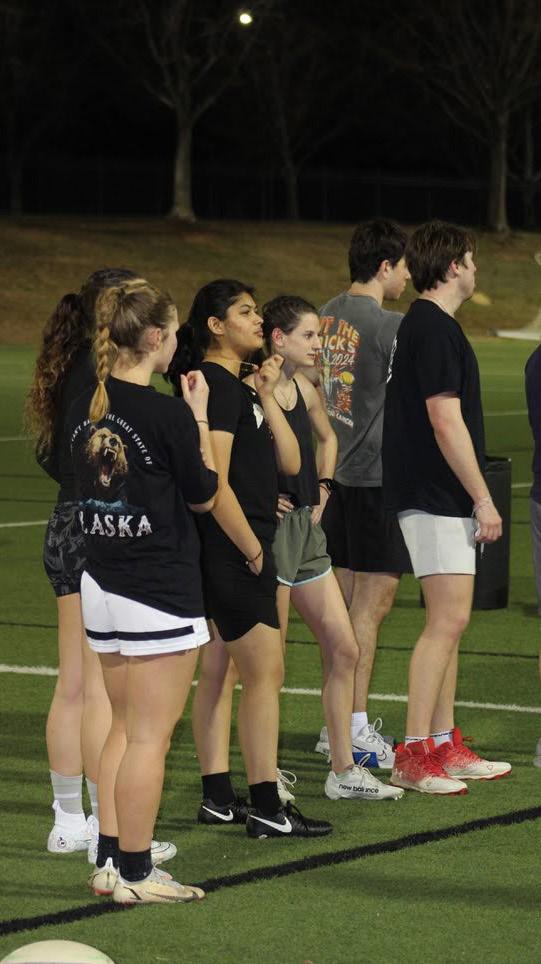
“We’re not going to cheat. We’re going to do it right,” Diaz called out. “And we’re going to have fu**ing fun.”
The students laughed as they began the drill, weaving between cones and passing the oval rugby ball — player to player, woman to man. It has been nine years since Club Rugby had female players on the pitch alongside the men, and the team is eager to expand the program.
A group of female students is reviving Women’s Club Rugby at Wake Forest University, nearly a decade after its dissolution in 2015. Under the guidance of Diaz, General Manager David Morris, Assistant Coach Chris Quigley and Women’s Head Coach David Stiffler, the team has been practicing alongside the men’s squad, learning the fundamentals of the sport. Many players had never touched a rugby ball before President Ojasvi Deep formed the team.
Freshman Maribel Johnson is one of the six founding members, along with President Deep, Vice President Grace Fettig, Treasurer Mia Knoll and Maya Chavis. Johnson also serves as the club’s social media manager.
“At the club fair, I looked around and realized we didn’t have a women’s rugby team,” Johnson said. “So
when I finally saw a flyer for it probably two weeks later, I was so excited. I immediately emailed and came to the first practice. We’ve grown a little bit each day, and we’ve had so much fun.”
Women’s rugby has seen a surge in global popularity, fueled by World Rugby’s Women’s Plan 2021-25 and the “Try and Stop Us” campaign. Female participation levels are at an all-time high, with 2.7 million women and girls playing worldwide — making up a quarter of all rugby players. Olympians such as Ilona Maher have inspired young women to embrace the historically male-dominated, full-contact sport.
“It is certainly empowering, especially with the 2024 Olympics,” Deep said. “We saw Ilona Maher and the U.S. women’s team place third, and now we’re starting our own team. With North Carolina’s growing rugby community, it’s great to be a part of that movement.”
The young team is composed primarily of freshmen, many of whom are former high school athletes applying their skills to a new sport. The women’s squad has been fully embraced by the long-standing men’s program and practices alongside them, learning the rules of the game, how to properly tackle opponents and how to run plays.
“
It feels like reclaiming power in a space that traditionally hasn’t been open to women. It’s so different from any sport I’ve played. I think a big part of femininity that isn’t enough is power, and rugby is the perfect place to embody that.
Coach Stiffler said is impressed by the team’s ability to grasp concepts quickly and ask insightful questions, crediting their intelligence both in the classroom and on the field. He said their determination and “unflappability” help them embrace rugby’s physical nature.
“There aren’t a lot of opportunities for full-contact sports for women,” Stiffler said. “I hear that flag football has been adopted as the version of football for girls, which seems like a cop-out to me. There’s no reason women can’t hit each other just as hard as men can.”
“The things that have made rugby popular throughout the centuries — its reliance on close teamwork and the ability to muster physical and mental toughness to overcome adversity — I don’t see anything unfeminine about that.”
The team has fostered a community of women who feel empowered to play rugby while growing as athletes.
“It feels like reclaiming power in a space that traditionally hasn’t been open to women,” Chavis said. “It’s so different from any sport I’ve played. I think a big part of femininity that isn’t talked about enough is power, and rugby is the perfect place to embody that.”
With the addition of the Women’s Club Rugby Team and the continued development of the Men’s Club Rugby Team, the sport is flourishing at Wake Forest thanks to the dedication of coaches and players.
“I like to emphasize to my athletes that it’s not just about the rugby,” Diez said. “It’s about having fun and enjoying it. The brotherhood and sisterhood we’re building — it’s about being a community.”
The women’s team, which now has 12 players, competed in its first 7’s match at the Triad Cup Tournament at Guilford College on April 5 where they won.
Both teams practice Tuesdays and Thursdays from 6 to 7:30 p.m. and welcome players of all experience levels. Follow @wakewomensrugby and @wakerugby on Instagram for more information.

10
THURSDAY, APRIL 10, 2025
Mia Springer, spriml21@wfu.edu
Beza Zelalem, zelam22@wfu.edu
Asst. Reese Lile, lilerl24@wfu.edu
On Tuesday, March 25, the Andrew Sabin Family Center for Environment and Sustainability hosted a conversation with former Environmental Protection Agency (EPA) administrators.
A packed crowd of students, professors, and community members filled Farrell Hall’s Broyhill Auditorium to hear former EPA Administrator Gina McCarthy deliver remarks. She then joined former Deputy EPA Administrator Janet McCabe for a Q&A, moderated by former EPA Acting Deputy Administrator Stan Meiburg, now executive director of the Sabin Center.
Clad in a crisp gingham blazer and speaking in her thick Boston accent, McCarthy immediately captured the audience with humor, realism and an unwavering determination to build a better future. Her energy was both inspiring and refreshing in today’s contentious political climate.
McCarthy, who spent the day engaging with Wake Forest students, opened by praising their sharp insights and tough questions.
“They [the students] gave me such a feeling that maybe I am underestimating just how quickly we can get our act together in the United States,” she said. “If young people continue to keep stepping up and continue to speak out, I think we have a really good shot at providing our kids a future we can all be proud of.”
The audience erupted in applause, momentarily drowning out the rest of her sentence.
McCarthy didn’t shy away from addressing the challenges facing environmental protection today.
“A lot is happening in our country and the world,” McCarthy said. “We’re dealing with a plethora of confusing—sometimes counterproductive and destabilizing, if not dangerous—announcements from the federal government. It feels like so much is at stake right now for our democracy, health, and wellbeing, and economic and national security.”
Despite these concerns, she remained defiant. “Nothing happening in this administration is going to tell me that we can’t succeed—because we can,” she asserted. “I’m Irish; I will fight to my death. And I may actually have to do that.”
McCarthy expressed deep concern over budget cuts within her “beloved EPA” but encouraged resilience. “Don’t panic. Buckle up,” she said, emphasizing the importance of collective action. She highlighted her work with America Is All In, a climate coalition advocating for policy change, and urged people of all ages to take action.
During the Q&A, McCarthy and McCabe discussed the future of U.S. involvement in international climate talks, how to engage people with differing political views on environmental issues, EPA authority and misinformation. They also discussed the role of state and local agencies in climate action.
McCabe, reflecting on her time in the Obama administration, emphasized local activism: “If the federal government isn’t going to work with us, and if you live in a state where leadership is lacking, go work with the cities, towns, counties, Boy Scouts, faith communities, and PTAs—who will.”
Meiburg closed the discussion by asking what Mc-
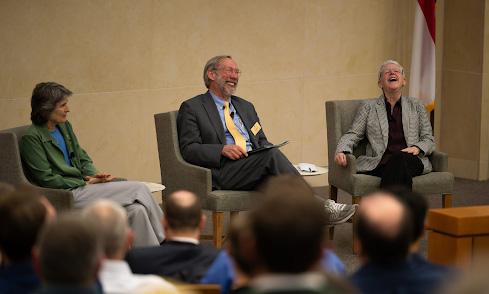
Carthy and McCabe would do differently in their careers if given a do-over. McCarthy quipped, “Well, I wouldn’t pick Janet,” sparking laughter from the audience—one of many lighthearted moments that balanced the evening’s serious topics.
McCabe, the more reserved of the two, answered thoughtfully, saying she wished she had built stronger relationships with fellow deputies across state departments.
As the evening concluded, the conversation returned to a theme of hope. “You have to give people something to run to, not just something to be scared of,” McCabe noted.
McCarthy agreed: “If people don’t feel like there’s hope and opportunity for them, then they give up. I’m trying to figure out the balance that gives people hope—and gets them excited enough to act.”
For these climate experts, the path forward lies in purposeful action—not just for the planet but for the people and generations who will inherit it.
—
The Old Gold & Black had the opportunity to sit down with both McCarthy and McCabe for further discussion.
Beza Zelalem: With the varying approaches to environmental regulation across states, how do you see the balance of power between state and federal governments in tackling these issues?
McCabe: Most environmental protection happens at the state level, including permitting, enforcement and inspections. No federal agency could cover all that ground. The EPA’s role has traditionally been to set
baseline standards so that whether you’re in Miami or Anchorage, you can expect clean air and water. Over time, perspectives on that relationship have shifted, but many states have strong environmental programs.
Zelalem: Public perception plays a huge role in climate policy. How should journalists and policymakers frame these issues to shift the narrative?
McCarthy: I ask myself that all the time. How do we communicate better? I want people to see the benefits of clean energy, like improved air quality and lower costs. A student asked me today, “Are you also telling people what happens if we don’t act?” And honestly, I don’t emphasize that enough. I tend to focus on hope, but they’re right—there’s real risk if we don’t seize these opportunities. Communities that need investment aren’t getting it. Without action, air pollution will worsen. I try to be optimistic, but we have to be honest about the stakes.
Zelalem: What does the future of environmental justice look like with the current administration?
McCarthy: We have to stay hopeful, but we also have to face reality. This administration is trying to pull back funding from marginalized communities— communities that were allocated resources for a reason. Environmental justice is about ensuring these communities receive the investments they deserve. We’ve always struggled with how to do better in that regard, and it would be a shame to see those efforts derailed now.
SHERYL ZHANG Staff Writer
On the windy afternoon of Saturday April 5, Scales Fine Arts Center pulsed with energy.
Inside Scales, heaps of old clothes awaited their rebirth—soon to be claimed by new owners. At the heart of the gallery, among photographs, multimedia installations and paintings, a 60-foot red serpent sat coiled as an impressive art piece commanding the space with quiet intensity.
Many gathered outside around a long table, feasting on a spread of fruit platters and cookies. At their feet, a golden retriever puppy lounges in the middle of it all, basking in an overflow of affection. Beside Scales, the bare yellow earth lies open and raw, but three new pawpaw trees are about to take root.
This is Wakeville 2025, the third annual student-led, interdisciplinary arts festival at Wake Forest, with a new focus: sustainability. This year’s festival, co-directed by juniors Roksanna Keyvan and Jade Donahue, transformed the student-led arts festival into a green revolution.
“What became, as a once bold idea, a space where art in all forms could be shared and discovered, has now become something more powerful,” Keyvan said in her opening speech. “Today, Wakeville is not only a showcase of artistic talent, but also a testament to our collective responsibility to the world around us.”
This year’s Wakeville offered more than its usual art galleries—visitors explored student showcases, creative WakerSpace workshops and a free community closet stocked with donated clothes.
A highlight of the event was a ceremonial tree planting beside Scales. Three native pawpaw trees were planted in honor of Wakeville’s evolving mission and to reinforce Wake Forest’s longstanding commitment to environmental stewardship.
For 14 consecutive years, Wake Forest has been recognized by the Arbor Day Foundation as a Tree Campus Higher Education institution. The university’s Tree Advisory Committee continues to ensure that every tree removed is replaced, that native species are prioritized and that construction projects protect the roots
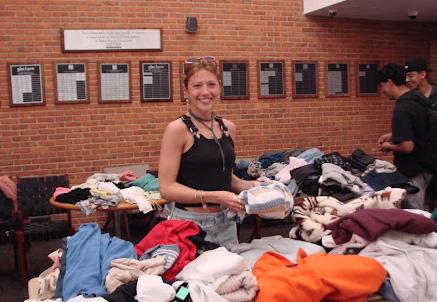
of existing trees. The pawpaw trees replaced a oncebeloved willow that stood in the same spot before naturally declining, marking a new start.
“This is not an act of labor, but of intention,” Keyvan said. “A symbolic commitment to the values we uphold at Wake Forest and to the future that we are building here together.”
Keyvan, an Environmental and Social Justice major, emphasized that planting native trees like pawpaws at Wake Forest strengthens environmental and community connections. She said campus should be ready to
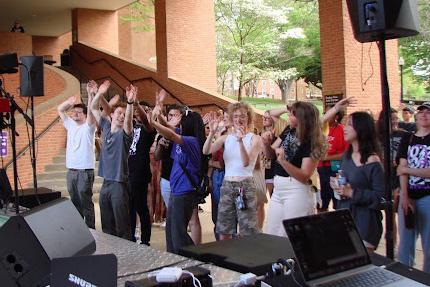
welcome more butterflies since pawpaw leaves are the exclusive food source for the caterpillars of the Zebra Swallowtail butterfly.
She also highlighted that “it is essential to recognize the land which we gather upon today.” She acknowledged the Indigenous peoples who originally inhabited the land, specifically “the Sahra, Catawba, Cherokee, Lumbee in this location; the Shikori, the Eno, the Sisapaha and the Oconeechee in the original campus location.”
“With this acknowledgement, we ground ourselves in the history of this land, understanding that sustainability is not just about what we plant, but also about how we honor, protect and learn from the past,” Keyvan said.
Yiyi Bai, one of Wakeville’s Arts Leads, shared that their main responsibilities included designing on-site activities, designing the event posters and flyers, recruiting student artists and setting up the venue. They also helped guide the audience to the interactive sustainability-themed activities, such as upcycling, which involves “making trash into art.”
They also supported student artists by encouraging submissions and showcasing works from various disciplines, including visual art, theater and music. This year’s Wakeville theme centered on sustainability, though some performances—like band or drama pieces—explored broader creative expressions.
When asked why she took the initiative to join the event, Bai said she was driven by her passion for art— but even more so by this year’s meaningful theme of environmental protection.
Described by Keyvan in one word— “interdisciplinary”—Wakeville incorporates cultures, media and causes. “He’s from Germany and he’s from France,” she said, gesturing toward friends DJing on site. She stressed that “art is so much more than just visual art. It’s like theater, it’s performance, it’s sound, it’s anything that really makes you just enjoy life and create. So any medium for creation, we invite them to Wakeville.”
Contact Sheryl Zhang at zhans21@wfu.edu
PAGE 12
THURSDAY, APRIL 10, 2025
Mattie Stillerman, stilmk23@wfu.edu Towne Moores, moortv22@wfu.edu
The views expressed in all opinion columns represent those of the article’s author, not the opinions of the Old Gold & Black Editorial Board
Keep cancer research out of the crossfire of political division
EDY MACKENZIE Contributing Writer
In 1989, when my grandmother passed away from cancer, our family did not have answers as to how or why. She had simply been “sick” and unable to recover. By the time my Aunt Gail was diagnosed with ovarian cancer in 2004, the world had progressed into explanations — my maternal family carries the BRCA-2 gene mutation, markedly increasing their risk of developing cancer. Knowing this crucial information about our genealogy, my mom and her siblings tested for the mutation to safeguard against a diagnosis.
Although we lost my Aunt two years later, the ongoing research into BRCA-2 and its treatment continues to help my family stay healthy. Hoping to aid these efforts, my extended family has volunteered for the Sandy Rollman Ovarian Cancer Foundation my whole life, raising vital funds for oncology research.
“ People of all different backgrounds, political views
and life experiences are impacted by cancer every day.
Cancer is the second leading cause of death in the United States. Most people have encountered a cancer diagnosis at some point in their life, whether for themselves, a family member/loved one or a coworker/mutual friend. However, not everyone knows how vital the role scientific research plays in advancing cancer prevention and treatment. The United States’ cancer death rate has declined by 33 percent since 1991, meaning approximately 3.8 million deaths were averted. This statistic is a direct result of years of oncology research dedicated to discovering the leading causes of cancer, improving screening for early detection and revolutionizing treatment options for cancer patients.
These strides in the fight against cancer have been made possible by consistent awareness and fundraising efforts — a topic close to the heart of Wake Forest’s values. Embracing our Pro Humanitate motto, the Wake Forest community raises money for the Brian Piccolo Cancer Research Fund at campus events throughout the school year, most notably Hit the Bricks and Wake N’ Shake.
Students work tirelessly to raise proceeds for cancer treatment and research at Atrium Health Wake Forest Baptist’s Comprehensive Cancer Center, and their efforts do not go unappreciated — the Wake Forest community has raised over $6.5 million for the Brian Piccolo Cancer Research Fund since its inception.
People of all different backgrounds, political views and life experiences are impacted by cancer every day. Normally, fighting cancer is a non-negotiable, uncontroversial cause to support. Yet, the new administration under President Donald Trump has made significant changes to this status quo.
Shortly after Inauguration Day, Trump froze funding at the National Institutes of Health (NIH), whose budget is primarily awarded through competitive grants to researchers at universities, medical schools and other research institutions across the country. Trump’s administration also made severe budget cuts to the Department of Defense (DOD) and the U.S. Department
of Health and Human Services. The U.S. Secretary of Health and Human Services, Robert F. Kennedy Jr., has cut thousands of jobs at national health agencies.
These initiatives directly slow the progress of cancer research, result in cancelled clinical trials and lead to the firing of oncology scientists.
“Currently, the NIH Funding has been cut by $280 billion, which includes cancer and other diseases,” said Robin Cohen, CEO of Sandy Rollman Ovarian Cancer Foundation. “Ovarian cancer funding at the DOD has been cut from $45 million to $15 million. Some cancers, such as pancreatic, have lost all of their DOD funding.”
Although they do not receive federal funding, Sandy Rollman has still felt the impact of these changes. The non-profit organization had to shut down one of their primary fundraising events, their Sandy Sprint 5K in Hollywood, Fla., due to a medical sponsor having to pull funding in the midst of such uncertainty. Other nonprofits, which more directly rely on government aid, have had to close their doors.
When asked how the current policies enacted by the Trump administration will impact the future of cancer research, Robin outlined a difficult road ahead.
“If things stay as they are, this will set us back 20 years,” she explained. “I also worry about the future of science. Who will be the next generation of scientists? Who will go into science the way things are now? There will also be less treatments for patients. Cancer will not wait. We’ve made so much progress with regards to treatment that will be stalled.”
The Wake Forest community is not exempt from these recent changes. Ruben Mesa is the president and executive director of the Atrium Health Wake Forest
Baptist Comprehensive Cancer Center, the institution that benefits from campus events like Wake N’ Shake. Mesa described a period of “significant concern” for biomedical research. With increased uncertainty and stress in a sector that has always seen consistent support from the government, cancer research progress can easily lose momentum.
Some examples of possible impacts Mesa outlined include a delayed hiring process for research personnel, uncertainties in grant review and cancelled clinical trials.
He also mentioned how the specific targeting of research labeled around Diversity, Equity, and Inclusion (DEI) can cause increased social disparities in cancer treatment, setting back important societal progress.
“The mission against cancer is clearly bipartisan,” stated Mesa.
Cancer affects everyone — it is a national concern. Wake Forest students of all political viewpoints run laps at Hit the Bricks, dance at Wake N’ Shake and believe in the impact of their efforts on helping those diagnosed with cancer live longer lives.
In the face of such drastic change under the current Trump administration, I ask my fellow students to stay informed. Do not shy away from reading the news or researching political topics. These policies are directly impacting issues we care about, delaying progress made over decades. Cancer is not controversial. Cancer is not a partisan issue. In the spirit of Pro Humanitate, I implore you to pay attention to these developments and fight for the causes important to you and our school.
Contact Edy MacKenzie at mackel23@wfu.edu

In times of political change, Wake Forest's students need more than empty promises
CAROLINE GOTTSMAN Staff Writer
An email inbox can feel like a battleground, especially for a university student. One must sort through professor announcements, countless advertisements, endless surveys and the occasional announcement from the school’s leadership. The importance of these emails is often measured by the speed with which they can be deleted: the trivial are instantly trashed; the semi-relevant ones are skimmed; and the crucial ones are carefully read and starred.
The most recent email from Wake Forest's leadership addresses the anxieties stemming from political shifts and the potential impacts that these changes could have on the academic environment here at Wake Forest. This email should demand a starred designation. However, its contents demand barely more than a glance.
The lack of specificity and heart
During times of political uncertainty, it is up to the university to do more than just acknowledge issues — it must advocate for its students and make them feel safe in their school environment. While Wake Forest has attempted this, the recent email from President Susan R. Wente, Provost Michele Gillespie and Executive Vice President Jackie Travisano leaves much to be desired.
The emphasis on upholding Wake Forest’s mission statement and showing compassion for fellow students, faculty and staff is appreciated, but ultimately frustratingly vague. In times when political decisions threaten people’s freedom and well-being, are the measures outlined in these emails sufficient, or does the university need to take more decisive action?
While this email is well-intentioned, it lacks the specificity, action and heart to prove effective and meaningful for those it is trying to comfort and support.
This email uses language that feels too structured and polished to come across as a meaningful statement. Phrases like “we will uphold Wake Forest’s mission” and “we will embrace all people” are important, but they lack the details to make them feel concrete and realistic. What does upholding Wake Forest’s mission look like in action?
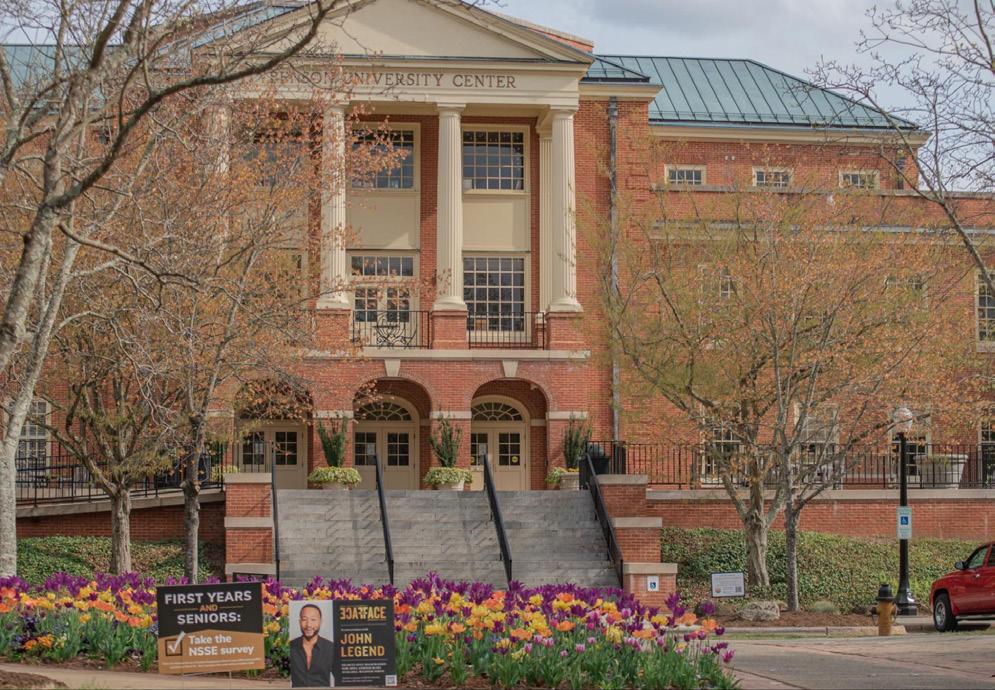
The email fails to outline this, and so the words come across as empty. The words are carefully polished, which strips them of any heart or real expression. Rather than offering a concrete plan or sympathizing with its students, this message reads like a collection of buzzwords designed to neutralize tensions rather than create tangible change.

A critical deficiency within this email is the absence of real action. While the email briefly mentions some actions that Wake Forest has taken, such as engaging “elected officials, peer institutions and associations” to “anticipate, understand, and respond to federal actions”, these measures do not seem like enough.
The email notes that Wake Forest leadership has been working to understand the policies, but is just understanding these policies enough? The university has a responsibility to proactively defend its students from potential harm. The exclusion of any real commitment to fight unfair legislation stands out as a noticeable omission.
“
While this email is wellintentioned, it lacks the specificity, action and heart to prove effective and meaningful for those it is trying to comfort and support.
What is truly needed is more of these tangible resources. Financial assistance, legal support and clear protocols for addressing specific situations or threats would have been far more reassuring than empty promises. Without definite plans for the problems that a student might face, how can students trust that the university will respond effectively if and when a situation does arise?
Additionally, the lack of specificity about the is -
sues that people are facing may be doing more harm than good. Phrases like “life-changing interruptions” feel detached from the reality of the severity of the situations that some people are facing. Students are dealing with deportation, discrimination or threats to their education, but the email refuses to specifically acknowledge their struggles. By refusing to name these issues, the university fails to take the crucial first step toward resolving those issues.
However, there is some good in this em ail. It mentions a “cross-functional government affairs steering committee” whose purpose is to guide the leaders of the university as well as update them about the political activity and its potential repercussions. This information will then be given to those who need it most in the Wake Forest community. A hyperlink is added to the email’s contents to direct students to a website that announces the executive orders that affect them. This directory is a nice touch to the email and adds a resource that students can rely on in times of confusion.
By sending this email, President Wente and Wake Forest University's leadership established important communication with its faculty and students, acknowledging the challenges that are being faced by the people impacted by these policy changes and offering some helpful resources.
However, the email’s lack of direct language and missing action keep it from achieving starred status and being a clarifying beacon in a dark time, instead relegating it to the depths of an email’s trash.
Contact Caroline Gottsman at gottca23@wfu.edu
A history of term limits and Trump’s disregard for them
EVA KATE PROBUS Staff Writer
In a previous article, I called Donald Trump a king.
This week, he decided that was a fitting title.
Last Sunday, in an interview with NBC news, Trump claimed he was “not joking” about running for a third term as U.S. President. Although Trump acknowledged it was much too early in the administration to vie for another presidential run, he confirmed it was possible.
Is that constitutional?
Running for a third presidential term is explicitly banned by the 22nd Amendment of the U.S. Constitution.
Unlike the contested nature of the 2nd or 14th Amendments, the 22nd Amendment leaves no gray area in its interpretation. The statement “no person shall be elected to the office of the President more than twice” sets a clear boundary on presidential power.
The 22nd Amendment is not flawless — constant presidential turnover contributes to stagnant ends during second terms and political instability. Despite its shortcomings, however, the amendment prevents any president from misusing their position. As executive power has been on the rise since Sept. 11, 2001, protections against the abuse of
power are essential.
Changing term limits through a constitutional amendment would require approval from three-fourths of the states – an unlikely scenario. However, when confronted with this reality, President Trump claimed there are “methods” to work around the 22nd Amendment.
During an interview with NBC, Trump said it was possible that Vice President J.D. Vance would run for president and then pass along the role to Trump. Legal scholars find this “loophole” implausible and doubt that Trump can feasibly run for a third term. Trump added that there were other methods to defy the 22nd Amendment, but declined to share them with NBC News.
The history of term limits (& lack thereof)
Franklin Delano Roosevelt was the first — and last — president to serve more than two terms. Roosevelt believed that by remaining in office during the tumult of the Great Depression and World War II, he could stabilize the nation.
Following Roosevelt’s death during his fourth term, Congress solidified this tradition through the ratification and passage of the 22nd Amendment in 1951. Now that the two-term limit is enumerated in the Constitution, any break in precedent would jeopardize the norm. Term limits are a recent addition to
the Constitution, but have long been a robust tradition. Before Roosevelt’s third term victory in 1940 presidents adhered to a two-term limit, though not constitutionally bound by this rule.
George Washington, the first President of the United States, established this precedent in his Farewell Address. Instead of running for a third term, Washington declined, opting instead to retire and step down as president. While Washington could make another presidential run, he emphasized the importance of the peaceful transition of power.
Trump already disregarded that piece of Washington’s speech — why not disregard another?
Is Trump serious?
As Trump said himself, it’s too early to tell whether he will make another presidential run. Even if Trump found a way to run for a third term, he would still have to campaign — and win.
Also, I’m not sure the bright red MAGA hats have room for “Make America Great Again… And Again… And Again!”
While the thought of an 88-year-old Donald Trump energetically hitting the campaign trail in 2028 seems rather unorthodox, Trump isn’t known for playing by the rules. Trump likened himself to a king in a social media post, blatantly defying the nation’s
history of democracy and freedom from tyrannical rule. He challenged the 14th Amendment’s guarantee of birthright citizenship, going against centuries of legal authority. If that is not enough proof that Trump disregards law and order, I can think of 34 other examples.
Maya Angelou, a famous poet and Wake Forest University professor, once said, “When someone shows you who they are, believe them the first time.” Donald Trump told America he is a king. I choose to believe him the first time.
Contact Eva Kate Probus at probek23@wfu.edu

Roosevelt served four terms and Washington chose to step down after two. What will Trump do?
SARAH MIKOLAICHIK Contributing Writer
Wake Forest has made praiseworthy efforts in sustainability, but it’s time to ask: Could the campus be doing more to expand these efforts beyond just the Office of Sustainability?
Climate change is a bigger problem than ever; with the U.S. withdrawing from the Paris Climate Agreement, it will only worsen over time. My sustainability efforts make me aware that no matter how much I attempt to better our planet, there is never enough I can single-handedly do to make a noticeable improvement to climate change.
Wake Forest has set the bar high for goals they aim to achieve as listed in The Office of Sustainability Existing Plan on this campus, such as renovating buildings to be more environmentally conscious, developing campus campaigns, integrating renewable energy on campus and optimizing existing space. They also won the STARS Gold Rating Award in 2018, an award that recognizes campus sustainability efforts.
Under the Office of Sustainability’s 2020 Sustainability Strategic Plan, one of their goals is to introduce at least 50% of students to disciplinary-specific sustainability content. However, being a Wake Forest student, I have not been offered any information on the issue of climate
change in any of my classes or been informed of ways I can contribute to sustainability efforts on my campus
There is an urgent need for more attention and help from large environments such as college campuses with proactive students. I want to bring attention to this issue on Wake Forest’s campus and work to expand these efforts to the greatest possible extent of students.
Wake Forest needs to implement ways to expand the environmental and sustainability teachings to a wider variety of departments across campus, not just the Environmental Science and Sustainability Studies major and the Office of Sustainability.
It is not a single department that will be able to change this issue; it requires a bigger audience that will give people a scope and perspective to see the world through every career path and field of study. It is not enough to have a handful of experts on this issue who advocate for it. It is more important to have a broader range of people across multiple occupations with environmentally conscious mindsets.
More people would be aware of this critical issue if environmentally conscious knowledge were taught in higher education. According to The Climate Conscious College Article, colleges around the country, especially in California, have successfully taken the initiative to incor-
porate sustainability teachings into every department. This has resulted in a greater integration of these practices in different job fields.
Wake Forest, a liberal arts college, can take action to implement the teachings of environmental sustainability through required divisional courses. Wake Forest aims to provide a holistic education through which students are immersed in all educational frameworks worldwide. Environmental sustainability should be included in this requirement of holistic learning at our liberal arts college to ensure all students at the university are acquiring this knowledge and carrying it into their professional lives.
Beyond implementing new requirements in their divisional departments, Wake Forest should encourage current faculty to incorporate sustainability into their existing curriculum. This can also be done through extra credit opportunities that motivate students to attend sustainability workshops and speaker events. The extra credit opportunities will embolden students to engage in sustainability events on campus and make them aware that they can easily participate on their own time.
In addition, Wake Forest could develop more interdisciplinary minors that intersect sustainability with fields such as business, law, healthcare and technology. This will encourage students to delve deeper
into this issue if they are passionate while still maintaining a major not directly related to environmental sustainability. Ultimately, expanding sustainability efforts at Wake Forest is not just about environmental responsibility but also about preparing students to become leaders in a world where sustainable thinking is essential. By incorporating sustainability into a wider variety of academics, Wake Forest can empower students to make meaningful contributions to a more sustainable future for our planet.
Contact Sarah Mikolaichik at mikose24@wfu.edu

Blake Robison, robiba24@wfu.edu
Sean Kennedy, kennsm21@wfu.edu
PAGE 15 THURSDAY, APRIL 10, 2025
Demon Deacons run-rule Seminoles twice, bounce back through stellar pitching and hot bats
SEAN KENNEDY Sports Editor
Wake Forest Baseball faced a tall task, going against the No. 4 Florida State Seminoles, a program that was on a hot streak going into the weekend.
They needed to bounce back in conference play after being swept by the then-unranked Virginia Tech Hokies the weekend beforehand. Between the team’s top arms and intimidating lineup, the difficulty of winning the weekend appeared hard.
The Demon Deacons dispatched the Seminoles, winning two out of three games to take the series. Freshman Dalton Wentz had a monster outing in all three games at the plate, hitting a home run in each outing and earning ACC Player of the Week honors for his performance. Between a mix of hot bats and stellar arms, the Demon Deacons run-ruled the Seminoles twice.
The heartbreaker
Wake Forest began the weekend with a devastating loss, losing on a ninth-inning walk-off to the Seminoles.
The Demon Deacons started pitcher Luke Schmolke for the first time this year, after the junior had taken a relief role throughout the season. Schmolke let up four runs through 3.1 innings pitched.
Wake Forest attempted a comeback from 4-0 down, scoring four runs across the sixth and seventh innings. Third baseman Wentz kicked off an ultimately stellar weekend by hitting a solo home run in the bottom of the sixth, and Marek Houston hit an RBI single in the seventh to tie the game at four apiece.
However, in the bottom of the ninth, the Demon Deacons could not keep the Seminoles off the board, being walked off and losing the series opener, 5-4.
“Offensively, we just didn't quite get it done,” said Head Baseball Coach Tom Walter via post-game statement. “We needed to take the lead there early and be able to go to our closer in that situation, which hopefully we can do tomorrow. I'm proud of the way we battled back and tied this game up, we just didn't find a way to punch across the key run.”


Despite the loss, the Demon Deacons came firing the next day, backed by a bounce-back outing for Logan Lunceford, who had struggled against Virginia Tech the weekend before. The right-hander came out dealing, notching nine strikeouts through 5.2 innings and holding the Seminoles scoreless.
The Demon Deacons continued this momentum at the plate, notching nine runs in the third and fourth innings to increase the gap to an 11-0 lead. Wentz bombed a three-run home run in the bottom half of the third inning to set the Demon Deacons apart, while outfielder Matt Scannell followed up with a three-run shot of his own in the bottom of the fourth.
After going 95 pitches and only allowing three hits, Lunceford was backed up by 1.1 innings of hitless ball from Zach Johnston and Troy Dressler, who kept the Seminoles off the board to complete a stellar 12-0 shutout that saw pitching performances shine.
“That's a great win that we had to have,” Walter said via post-game statement. “Lunceford was the story with four shutdown innings… [Florida State's] starter is really good and I thought we had a great plan, so give credit to Coach [Bill] Cilento and Coach [Matt] Wessinger for putting a good plan together and for our guys executing it.”
Similar praise can be said for Sunday’s pitching performances, when starting pitcher Blake Morningstar continued the Demon Deacons’ stretch of terrific pitching performances. Morningstar went five innings and let up two runs.
“Blake Morningstar set the tone for us,” Walter said via post-game statement. “He just kept battling and kept battling until we got a chance to break through, and I was just so proud of Blake. He just kept coming and kept making pitches when we needed him to, and that was huge.”
The Demon Deacons continued their hot stretch at the plate, too. The bats were set alight in the fourth inning when Wentz hit his third home run of the weekend to knot the score at two. Outfielder Cam Nelson followed up with his first career home run, and the De-
mon Deacons wouldn’t end there.
In the following frame, Wake Forest scored seven runs, as Kade Lewis notched two hits and three RBIs in the same half-inning to put the game out of reach.
Wake Forest experienced top-notch relief performances from Josh Gunther, Haiden Leffew, Nate Whysong and Griffin Green, each of whom did not let up a run in their appearances.
The Demon Deacons finished off the Seminoles, 172, and took a crucial series against ranked competition.
Despite winning the weekend series, the Demon Deacons did not come out of the weekend unscathed.
On Monday, it was revealed that Wake Forest star outfielder Ethan Conrad was ruled out for the season with a lower back injury, which had sidelined him for the past few weeks. Conrad elected to have surgery, which is expected to take place on Thursday, April 10.
The Marist transfer more than lived up to expectations, hitting at a .372 batting average and .495 on-base percentage this season, the latter of which was a careerhigh. Conrad also knocked in 27 RBI,
Conrad also scored via the long-ball, hitting seven home runs through 21 games and 78 at-bats. He had a season-high in RBIs (4) against Long Island earlier this season.
In his stead comes Nelson, who started in the midweek matchups against High Point and UNC-Greensboro, as well as the series against the Seminoles. Nelson had a productive weekend against Florida State, putting up four RBI and a home run during Sunday’s 17-2 win against the Seminoles.
It will be hard to replace Conrad's talent, but the Demon Deacons need Nelson to continue his improved performance as the team travels to play No. 16 North Carolina this weekend. Wake Forest expects to start a rotation of Chris Levonas, Lunceford and Morningstar on the mound.
Contact Sean Kennedy at kennsm21@wfu.edu
TEE JOHNSON Staff Writer
The Wake Forest Men’s Golf team had another solid showing this week at the Calusa Cup at Calusa Pines Golf Club in Naples, FL. While the Demon Deacons finished 33 shots behind the tournamentwinning Florida Gators, the cup proved to be an incredibly competitive event, with seven ranked schools participating — including No. 46 Wake Forest.
The Demon Deacons managed a topfive finish, ahead of top teams like No. 4 LSU and No. 8 Virginia. It took a -3 team score on the day to move up one place from sixth into fifth, after shooting a combined +19 through the first two rounds.
On the individual leaderboard, the highest-placing Demon Deacon was senior Marshall Meisel, who managed an impressive +1 overall score after shooting +1, E, and E in his three rounds. His consistent play was particularly impressive, considering the rest of the Wake Forest starting lineup was much more volatile.
Round one was not great for the Demon Deacons, with the team shooting a combined +8, and not a single starter scoring below par. Wake Forest struggled on the short game, and not a single player managed a birdie on any of the par three holes in the first round.
Head Coach Jerry Haas expressed optimism following the opening round, noting both positives and areas for improvement.
“There were lots of good things today,

The Demon Deacons managed a top-five finish over schools like No. 4 LSU and No 8 Virginia.
but making a few more putts will be helpful,” Haas said.
Round two was a similar story, with Wake Forest shooting an even worse +11, falling to sixth in the leaderboard.
“Not our best day, but our guys were really battling through some things out there today,” Haas said after round two.
“We still have a chance to move up the leaderboard, and I know these guys know this course well from playing in this tournament the last few years.”
Wake Forest finally got things going in the final round, with a combined score
of -3 and just two players over par on the day. Entering the round two shots behind fifth-place LSU, it was going to take a strong performance from the starters to sneak into the top five, and they delivered.
Meisel, who was tied for eighth entering the final round, was not able to capitalize on a relatively easy day on the course, where the individual scoring average was nearly two shots better than the previous two rounds. Despite this, the Maryland native led the way for the Demon Deacons all week long and has emerged as a reliable scorer for Haas and his team. He tied for the tournament lead with 39 pars, showcasing his consistency and avoiding costly mistakes throughout the event.
As a team, Wake Forest was able to do the most damage on the par five holes, where they had the third best scoring average of 4.77, shooting a combined -14. However, Wake gave the most strokes back of any team on the par three holes, with a scoring average of 3.42, and a combined score of +25. The Demon Deacons had just three birdies on par threes the entire tournament.
“It’s always nice to finish the event with our best round,” Haas said. “It shows a lot of heart and guts.”
Next up for Wake Forest Men’s Golf is the ACC Championship, starting on Monday, April 28. It will be held at The Club at Olde Stone in Bowling Green, KY.
Contact Tee Johnson at johntg23@wfu.edu
Columnist Nat Wiegmann explores what college athletics need for a bright future
NAT
WIEGMANN Staff Columnist
This article represents the view of Nat Wiegmann, not the Old Gold & Black.
Despite the excitement that typically defines March Madness, this year’s NCAA Tournament lacked the Cinderella stories and major upsets that make the event so thrilling. Instead, it has exposed deeper issues plaguing the sport. If left unaddressed, these problems could threaten the future of college basketball. In this new era shaped by NIL and the transfer portal, meaningful changes are needed to preserve the competitiveness and unique charm of the college game.
NIL (Name, Image and Likeness) was first implemented in college sports in summer 2021. It was created with the intent of allowing college athletes to profit off of their name through brand sponsorships, advertisements, social media deals, autograph signings and other marketing opportunities.
What began as a way for athletes to capitalize on their success has, in many cases, turned into a pay-for-play model, where schools and booster collectives use NIL as a recruiting tool, offering financial incentives to lure top talent. This has created major issues that put large institutions at a significant advantage when recruiting and retaining players.
However, these issues can be addressed through smart reforms. First, there needs to be a cap on how much a program can spend annually on NILrelated compensation. While smaller schools will never have the same financial power as major programs, a cap would at least narrow the gap, giving them a better shot at competing and succeeding on the biggest stage.
Second, the current system needs greater transparency and structure. Currently, NIL deals are often informal and short-term, with little consistency from year to year. Players can bounce from school to school based purely on who offers the best deal, making it difficult for teams to build continuity. Implementing standardized, contractbased agreements—ideally, multi-year deals—would not only bring stability to rosters but also reduce the constant turnover driven by the transfer portal. It would also provide better protections for both players and schools, helping to prevent misunderstandings, broken promises, or exploitative situations where unrealistic or misleading offers lure athletes.
Clear contract terms would ensure that athletes understand exactly what they’re committing to and what they’ll receive in return, while schools could plan their rosters with greater certainty. This structure would also help restore
JUSTIN KONTUL Contributing Writer
April is here, which means that the Masters season is upon us. Golf season is heating up with the first yearly major at Augusta National Golf Club in beautiful Augusta, G.A. Tournament play starts April 10 and concludes April 13. This year, there are a number of players and storylines to keep an eye on.
The first major player to keep an eye on heading into the tournament is the defending Masters, PGA Tour and Olympic champion Scottie Scheffler. Scheffler is currently the No. 1-ranked golfer in the world. Last season was historic for Scheffler, who won seven official PGA Tour events — the most since Tiger Woods in 2007. This year, he looks to claim his third green jacket and further cement his legacy.
Aside from the defending champion, four-time major champion Rory McIlroy is still in search of his first green jacket. McIlroy recently won the Players Championship— what some consider to be the fifth major in golf—and he is rounding into form as the event approaches, standing as a strong contender.
Other golfers in the hunt for the green jacket include reigning PGA Champion and Open Champion Xander Schaffale and reigning US Open Champion Bryson DeCham- beau. Ludvig Åberg, a young star on the PGA Tour, is coming off of a solo second-place finish last year at his first Masters appearance.
trust in the system and reduce the chaos of the current NIL landscape.
Another necessary change to reduce excessive player movement is reinstating the rule that requires athletes to sit out a year if they transfer a second time. With exceptions only in specific cases such as a coaching change or a successfully granted waiver.
The current system, which allows players to transfer freely and immediately multiple times, has led to a revolving door of rosters and has eroded team identity and development. Reintroducing the sit-out year for second-time transfers would encourage players to make more thoughtful, long-term decisions when choosing a school rather than treating each season as a bidding war.
If college basketball wants to preserve what makes it special, it must evolve with care. The rise of NIL and the transfer portal doesn’t have to ruin the game, but without thoughtful regulation, they very well could. Implementing smart, balanced reforms can help protect the integrity of the sport while still allowing athletes to profit from their name. This way, the madness of March can continue to be about buzzer-beaters and underdog runs, not just money and movement with the top teams dominating everyone else.
Contact Nat Wiegmann at wiegnh23@wfu.edu
The Masters will be filled with attention surrunding the competition between LIV Golf and the PGA Tour. As of late 2021, we have not seen all the best players in the world compete on the same stage outside the four major championships. Players like John Rahm, Brooks Koepka and Bryson DeChambeau, who play on the LIV Golf Tour, do not normally have the opportunity to go up against players like Scheffler and Mcilroy. This rare reunion is sure to draw increased attention from all sports fans and media alike.
One of the largest storylines of the event is the absence of a legend. Five-time Masters champion Tiger Woods suffered a ruptured left Achilles tendon while practicing at his home in Florida in March, meaning a long road to recovery for Woods, which forced him to not participate in the event this year.
Wake Forest has a pair of alumni playing in the event, with Will Zalatoris and Cameron Young each set to play. Zalatoris has notably had success at Augusta in 2021, when he finished as a runner-up to Hideki Matsuyama. Young’s best finish was tied for seventh in 2023.
Contact Justin Kontul at kontjj24@wfu.edu
Former Athletic Director oversaw five NCAA championships, 22 ACC championships at Wake Forest
SEAN KENNEDY Sports Editor
A legendary career at Wake Forest will be recognized on the national stage as former Athletic Director Ron Wellman is set to be inducted into the National Association of Collegiate Directors of Athletics Hall of Fame.
“Having the opportunity to work in college athletics my entire career was my ultimate dream,” Wellman said via a statement. “Working with the athletes, coaches and administrators at Wake Forest for 27 years was certainly the highlight of my career… Honestly, this is the result of having so many outstanding administrators and coaches surrounding me. I am indebted to them for all that they have achieved...and will continue to achieve.”
Wellman shaped many lives and careers at Wake Forest, including that of current Vice President & Director of Athletics John Currie, who joined Wellman’s staff in 1993. Currie would later return to Wake Forest, succeeding the retiring Wellman in 2019.
“Ron Wellman’s unwavering integrity, vision, and commitment to student-athletes have left an indelible mark not only on Wake Forest, but on college athletics as a whole,” Currie said via a statement. “I come to work honored and humbled by the responsibility to build upon the incredible legacy he continued at Wake Forest. No one more is deserving of this honor than Ron.”
Wellman became Wake Forest’s fifth Athletic Director in school history in 1992. He joined Wake Forest under the reign of Thomas Hearn, and continued under both Hearn and Nathan O. Hatch for the entirety of his 27-year tenure as Athletic Director.
"For many years, I had the privilege of working closely with Ron Wellman and witnessing firsthand his extraordinary leadership and commitment to Wake Forest,” Hatch said via statement. “His steady hand, principled approach, and deep care for student-athletes set a standard of excellence that defined an era of tremendous success… his induction into the NACDA
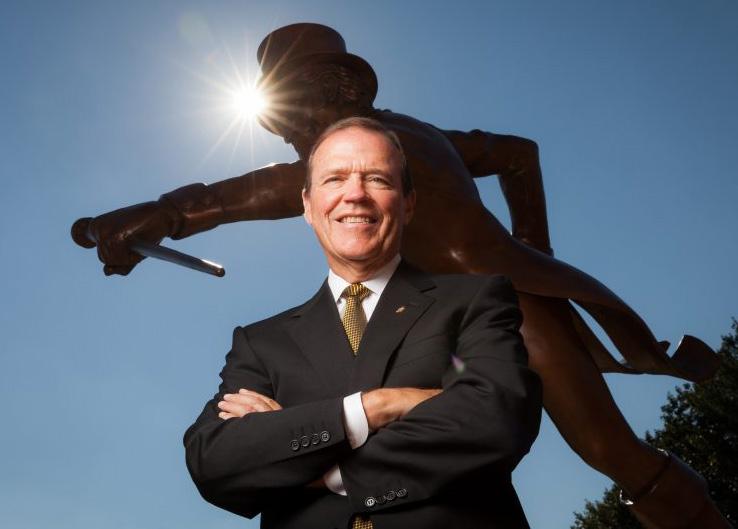
Hall of Fame is a fitting tribute to a career dedicated to advancing collegiate athletics the right way."
During his tenure, Wellman led the hirings of Head Coaches who would later be key figures on campus, including former Men’s Basketball Head Coach Skip Prosser and former Head Football Coach Dave Clawson.

while John

succeeded the Wake
student at Wake Forest.
Wentz has become a stalwart at third base, making tough defensive plays all season- but more impressively, the freshman earned ACC Player of the Week honors after a high-powered week at the plate. Wentz hit home runs in each of the three games against No. 4 Florida State, and slashed a .500 batting average (8-for-16) over the course of the weekend. Wentz became the second Demon Deacon this season to earn the honor after Marek Houston won it the first week of the season.
“I am incredibly proud to have been hired by Ron Wellman, a leader I have long considered one of the finest individuals in all of college athletics,” Clawson said via statement. “His unwavering commitment to integrity, student-athlete success, and excellence has left an indelible mark not only at Wake Forest but across the entire collegiate sports landscape.”
Wellman has also hired multiple current coaches, including Head Men’s Soccer Coach Bobby Muuss, Head Field Hockey Coach Jennifer Averill, and Head Baseball Coach Tom Walter.
“Ron’s impact at Wake Forest really speaks for itself,” Averill said via statement. “He was a transformational leader who guided our coaches and studentathletes with integrity and a strong sense of purpose. It’s been an incredible honor to be part of his journey in college athletics.”
“I can’t begin to tell you what this man means to me,” Muuss added via Twitter/X post. “He has shown me support, mentorship, patience (a lot of it), grace and love… He gave me a chance of a lifetime. He lives and leads with humility and honor.”
During his tenure at Wake Forest, Wellman oversaw an athletic department that won 22 conference championships and five NCAA team championships, including three consecutive national championships in field hockey (2002-04). Wellman was also inducted into the Wake Forest Sports Hall of Fame in 2021.
Contact Sean Kennedy at kennsm21@wfu.edu
For us to finish off the regular season at home and go undefeated here in front of our fans, what a great way to finish.
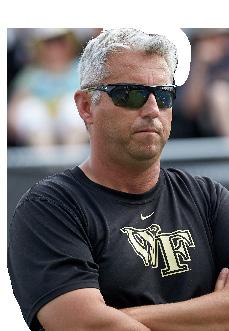
Lydia Derris, derrlf23@wfu.edu
THURSDAY, APRIL 10, 2025
Grace Schuringa, schugh24@wfu.edu PAGE 18
“The
ADAM COIL Senior Writer
Wake Forest University Theater Department’s production of “The Tempest” opened on April 7, after almost a year of effort in the making.
Its story began in the summer of last year with senior dramaturg Ellie Howell’s URECA project. She worked with Director Michael Kamtman to research how ancient theater techniques could be used to reimagine the last play Shakespeare ever wrote.
Howell’s efforts were invaluable for two major components of the play. Her research on the use of silks in Chinese opera influenced Kamtman’s vision of the storm scene, in which the spirit Ariel creates the illusion of a shipwreck. Her research on shadow puppetry was used to help explain the backstory of the play.
Instead of relying entirely on Prospera (played by Professor Leah Roy) to orate how she and her daughter were shipwrecked on the island twelve years ago, shadow puppets behind them help visually explain the story to the audience.
The play has also had a special significance for Kamtman for some time. Not only has he spent most of his life studying Shakespeare, but he even once performed it himself, playing the enigmatic role of Caliban, a native of
Shakespeare’s comedy comes to life as a must-see spectacle
the island that Prospera has enslaved with her magic.
Kamtman described freshman Ashley Collings, who played Caliban, as “a director’s dream.” While he admitted he has some insights into the role, he was mostly focused on letting Collings make the role her own, which she appreciates.
“He’s a good resource to go to because he’s been in my shoes too, so he knows the physical strains of what you’re doing,” Collings said. “He knows the vocal strains of what I’m doing as a girl playing a decrepit-fish-manmonster… He’s completely understanding.”
The anger and resentment festering in Collings’ performance are well balanced out by some other major presences on stage. Senior Isabella Biricik plays an emotionally explosive Miranda that helps sell the insanity of her falling in love with Ferdinand. Fellow seniors Will Rothschild and Zac Anderson dominate their stage time as Alonso, king of Selpan, and Stephano, the drunken butler.
Rothschild said that he is much more accustomed to playing silly, lighthearted characters, but his commanding voice made for a convincingly devastated king. Meanwhile, Anderson produced countless laughs, particularly because of how much energy and gaiety he brought to his “scurvy tunes.”
In my view, though, the work of the production crew steals the show — or, at least, my
attention. Set designer Rob Eastman-Mullins went all out in his multifaceted conception of the island, constructing four false prosceniums to make the island feel alive with possibility, as if anything could come from anywhere at any time. The bulbous, translucent structure paired perfectly with the lighting as well, as it was able to glow and change colors throughout the play, as if reacting to the actors’ words and actions in real time.
The lighting and sound were crucially immersive while also enriching the many wrinkles of the play at the same time. Sophomore JM Stowers artfully embraced the challenge of building all the props for the play, including Prospera’s staff (which he only lost and had to remake once). In many ways, the story of “The Tempest” is told by that staff, and Stowers' robust and animated design more than lives up to the magic that such a prop commands.
Kamtman’s production overflows with visual elements to feast one’s eyes on, but it’s his care and passion for the world of Shakespeare that shines through the entire play, both the performative and production components.
“Because I have this lifelong love of Shakespeare’s work, I always feel transported in my mind from all the roles I’ve had, no matter how few or how many lines I have,” he said. “It’s like this full body, full-spirit experience that taps into every physical, mental and
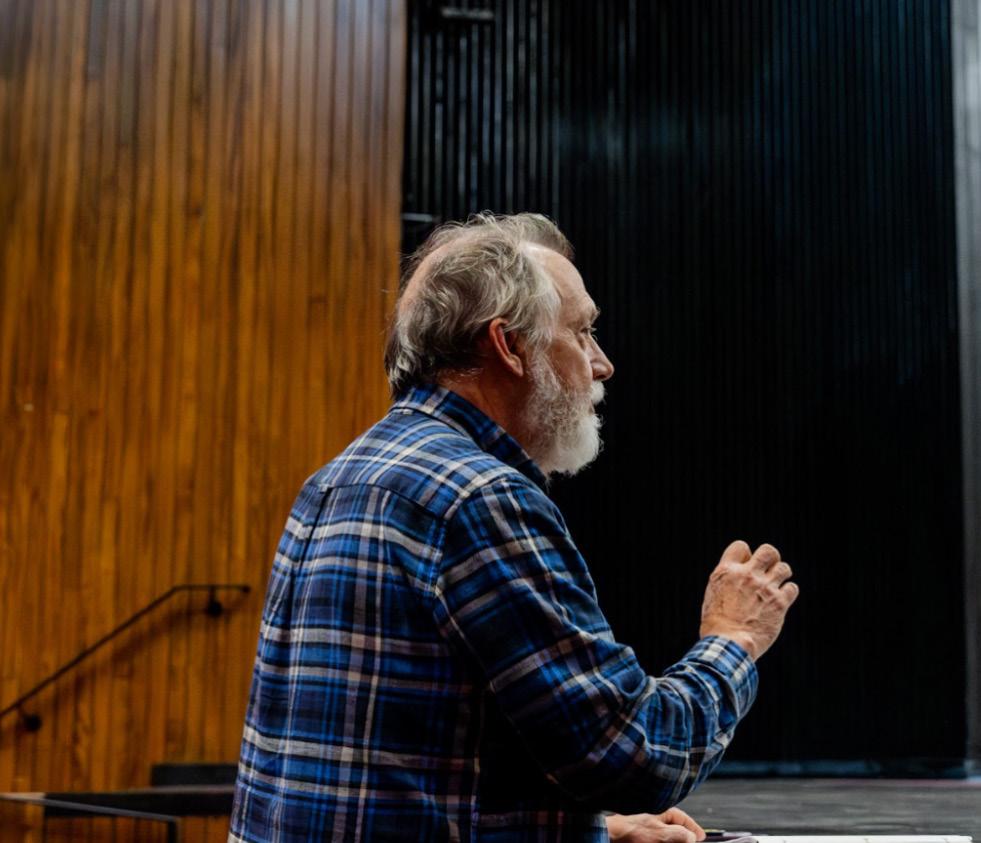
&
Director Michael Kamtman as he gives directions to his actors.
imaginative resource you have.”
“The Tempest” is Kamtman’s first mainstage production at Wake Forest, and as he nears retirement, he embraces and even takes comfort in the fact that it might be his last.
“I am much older than Shakespeare was when he wrote this play,” he said, “and I was thinking, ‘What if this is the last play I get to direct?’ It would be a great one to finish my career with.”
Contact Adam Coil at coilat21@wfu.edu
Reynolda House’s latest exhibition traces Andrew Wyeth’s decades-long fascination with Kuerner Farm
LYDIA DERRIS Arts & Culture Editor
Art exhibition “Andrew Wyeth at Kuerner Farm: The Eye of the Earth,” co-organized by Reynolda House Museum of American Art and the Brandywine Museum of Art in Chadds Ford, made its national debut in February 2025. It will make its way to the Brandywine this summer, and conclude its route at the Cummer Museum of Art & Gardens in Jacksonville, F.L., where it will run into the early months of 2026.
This is not merely a collection of landscapes and impressions, but rather an ode to Wyeth’s lifelong communion with Kuerner Farm in Chadds Ford, P.A. Andrew Wyeth was inextricably captivated by the farm, and it functioned as a font of inspiration for his work. Wyeth produced nearly 1,000 depictions of the farm over a course of six decades. Primarily using watercolor and tempera, a multitude of studies depicting landscape and personage shaped Wyeth’s creative tenets throughout those years.
Wyeth shaped and reshaped the farm’s contours and tenses, not just as a painter of a place, but as someone in devotion to it. The exhibition meditates on this fidelity — to solitude, to muses, to winter’s bleak honesty — and above all, to presence.
Kuerner Farm, though deceptively remote and barren, distilled every semblance of light and stimulation a lucrative creative life demands into Kuerner.
Wyeth walks us to the shore of Kurener pond, the crystalline void that occupies the
center of the farm — a marker Wyeth praised as “the eye of the Earth.”
The farmhouse looms above the pond, stark in geometry and shadow, offering a meditative backdrop for Wyeth that is quiet, still, and yet aflame with psychological tension. “The Eye of the Earth” surveys not merely a space but a relationship between an artist and indigenous lands, belonging to the Lenni-Lenape and its assigned transformation by Wyeth into a space of lush interiority.
The exhibition examines the farm as an active subject, telling an alternate mode of American art that finds solace and meaning outside of the cityscape. A through line is drawn from the initial gothic realism of early Wyeth to the abstract expressionism he taps into as he nears death.
A delicate watercolor that shows the kitchen window and a fallen log are the central points in “Groundhog Day” (1959). Wyeth uses transparency and gouache, allowing the white of the paper to shine through, mimicking snow. He accents the piece with flicks of opaque white to mimic falling snowflakes. “I love the bleakness of winter and snow and get a thrill out of the chill.” Wyeth once said of snow. “There's a danger in it. You never know how it's going to turn out.”
A loose and moody watercolor study for tempera, “Brown Swiss, Farm Pond” (1957), presents the Kuerner pond flanked by fence posts and overlooked by the blocky farmhouse. A bare tree punctuates the midpoint. Wyeth’s composition emphasizes the pond’s reflection — his eye drawn to water, silence and the in-between. Later, in the finished tempera, the pond becomes less wintry, the
composition more horizontal and the palette more brown than white.
“God, I’ve frozen my ass off painting snow scenes!” Wyeth said, “My winter scenes differ from those of other artists in that they are not romantic. No! They capture that marvelous, lonely bleakness, the quiet, the chill reality of winter.”
Among the more unsettling works in the exhibit is “The Kuerners” (1971), which portrays Anna and Karl Kuerner in a whitewashed room. Karl, bundled in a thick coat, holds a rifle that bisects his torso and points directly at Anna, who stands in profile — tense, bearing an indiscernible visage. An antler rack once hung between them, but Wyeth sanded it away, leaving what critic Brian O’Doherty called “an appalling stretch of blank.” The negative space between them holds a damning weight that Wyeth likely perceived between Anna and Karl.
Although not included in Reynolda’s exhibition beyond a single portrait, Wyeth’s decades-long series of paintings of Helga Testorf — his muse and best-kept secret — looms large and played intimately on my personal emotional vocabulary.
Over fifteen years, a created 240 works of Helga, none shown to the public — or to his wife — until he was ready.
“My intention was to keep ’em hidden away until I died,” he said in an interview with Thomas Hoving, once director of the Metropolitan Museum of Art. “I didn’t want anyone to know that I have fallen deeply in love.”
The Helga pictures are not erotic so much as reverent. Wyeth described himself as need-
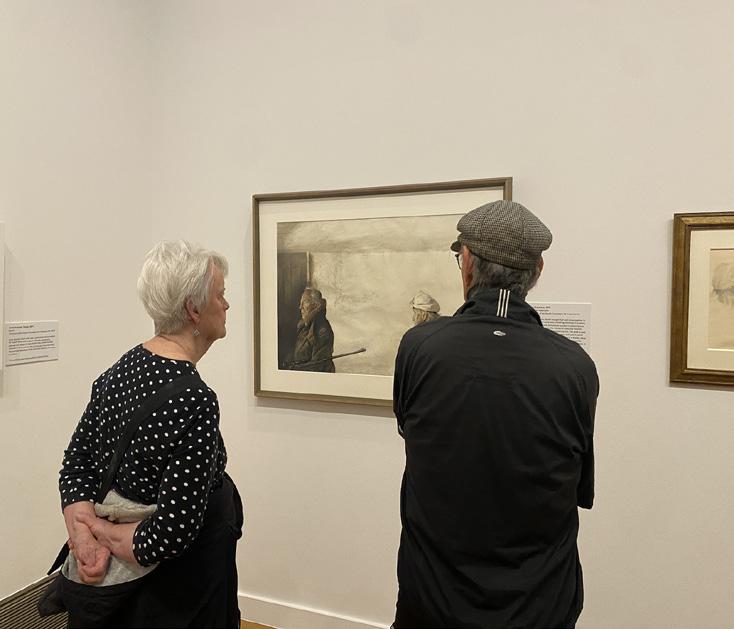
A couple contemplating "The Kuerners" (1971) at Reynolda House.
ing to “fall in love” with his subjects — not necessarily sexually, but deeply and personally.
“Many artists tell me they don’t even recall the names of their models. I have to become enamored. Smitten.” said Wyeth.
In Helga, he found someone who understood this form of communion. His wife, when asked about the Helga paintings, simply said: “All I see is love.”
“The Eye of the Earth,” is by far the most impactful exhibition I have borne witness to at Reynolda House. It isn’t just an illustration of landscapes, it's a meditation on Wyeth’s troth to the land. He wielded silence into pure expression.
Contact Lydia Derris at derrlf23@wfu.edu
Ten sketches, innumerable dance breaks and zero mercy, the Banshees go out with their d**ks in hand
LYDIA DERRIS & COLLYN BALLENTINE Arts & Culture Editor & Staff Writer
Editor’s note: This article reflects the views of Lydia Derris and Collyn Ballentine, not the Old Gold & Black.
The Lilting Banshees — (allegedly) Wake Forest’s sharpest comedic minds — closed out their season with “Pants Down XVIII” on April 2 in Brendle Recital Hall. With two sold-out shows and a devoted crowd, the Banshees delivered a chaotic and hilarious send-off packed with satire, absurdity and all the campus inside jokes their fans have come to expect.
Before any actors even hit the stage, the Banshees set the night’s tone with their signature meme slideshow — a Banshees ritual that combines absurdist and hyper-specific references to campus life. Greek life, admin emails, overcommitted students and the personality taxonomy of Wake Forest colloquialisms were all fair game. The slideshow was ridiculous and garnered an audience-wide gasp more than once.
The pre-show video was not successful with the audience. The sketch explored the late-night horrors of Zick’s. While it was intended to play into absurdist humor, it was unsuccessful because it was not clear to the audience what was going on. It felt more like a confusing fever-dream with no punchline.
But then the lights dimmed, and the Banshees did what they do best: call out stereotypes, skewer students’ odd behaviors and hold the administration accountable.
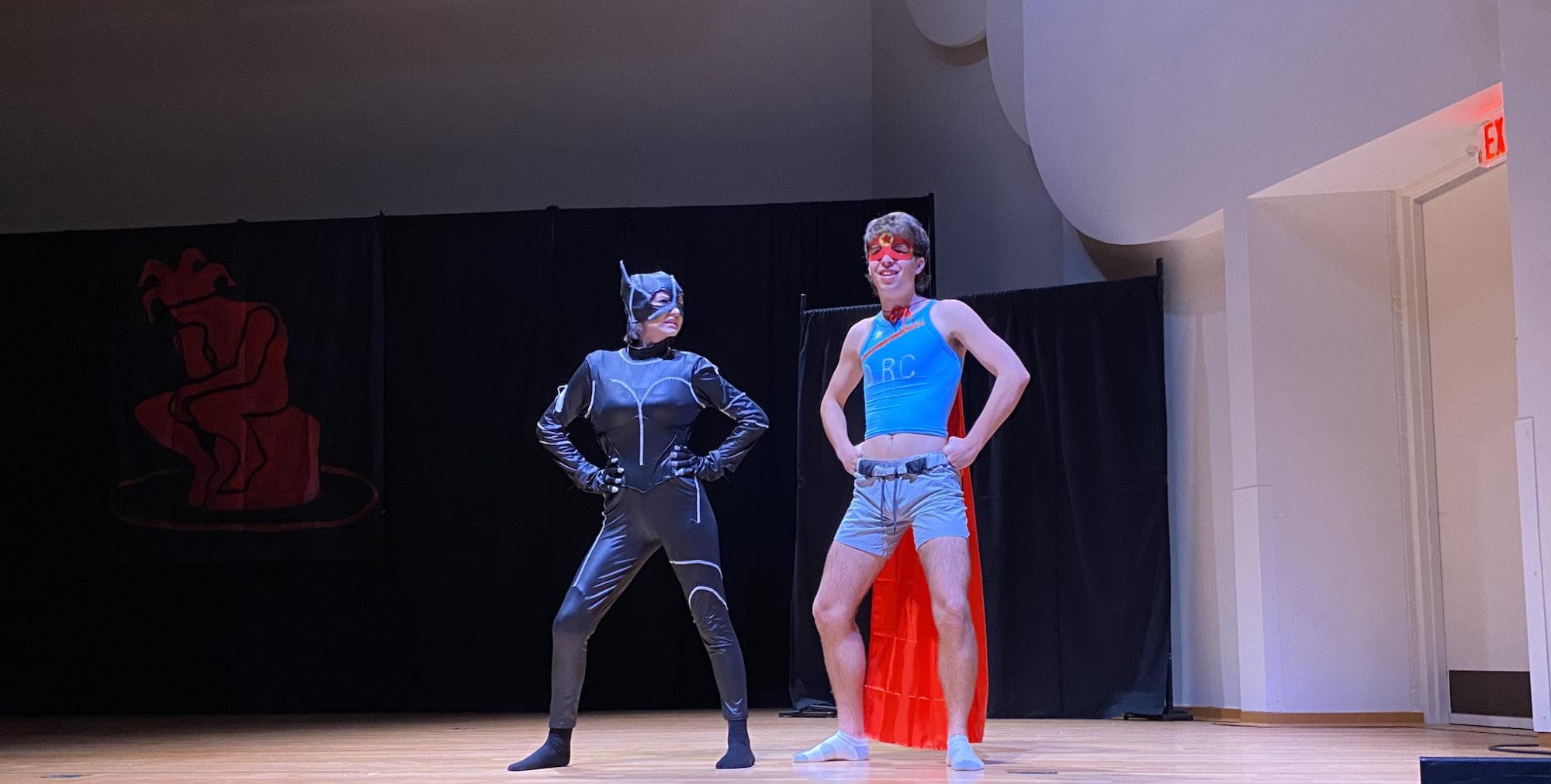
Here are our stand-out sketches of the night:
“Live KA Scribe”
Our first praise goes to the skit “Live KA Scribe,” featuring George Denby, Jake Randall, Sebastian Terryn, Hamza Mian, Hayes Kennedy and Will McKenzie. It opens with a KA fraternity hazing lineup getting yelled at about who “snitched” and called the school to get the frat kicked off campus. One boy then shows his phone call history and his last phone call was from Roberta E. Lee (his grandma). The lineup is interrupted by their Live Stenographer, who reveals a hilariously damning transcript of every problematic thing ever uttered in the house — filed into two boxes: “Slurs” and “Title IX.” They
didn’t hold back in mocking the fraternity’s dark past and its present reputation for being southern and conservative-leaning. It was, hands down, the funniest of the evening.
“Machi Meat Cube”
Next up was, “Machi Meat Cube,” featuring McKenzie, Denby, Thomas Bolt and Charli Head. This sketch deserves its own cult following. The Machis form a band despite lacking any musical talent, and Chi Os instantly lose their minds over it. The girls’ over-the-top excitement — even as the band played “Hot Cross Buns” in emo wigs — was a nod to how deep the frat-sorority alliances can run on Wake Forest’s campus. And the band name? “Meat Cube.” It satirizes both the performative weirdness of Machis and a
refreshing switch up from their usual gay jabs.
“Dr. D**k Long”
The ninth sketch, featuring Randall, Margaux Ellis and Moran was, to be quite blunt, not funny to me at all. It features “Captain Democratic Republic of the Congo” (Randall) and his sidekick “Kitty” (Ellis), trying to get rid of Richard Long — Who has a massive d**k. That’s why they call him Doctor Richard Long, get it? This may have been funny to anyone who knew the people in the sketch, but to me, it was plain odd.
The Lilting Banshees are, at their best, a mirror held up to campus culture — distorted, maybe, but always grounded in real observations. They know exactly what they’re doing, and “Pants Down XVIII” proves they can still push boundaries without losing the crowd (too much).
Not every sketch hit, mostly due to sketches that did not apply to campus life and antics — they simply were not universally relatable to the Wake Forest student body. I do think it is good that they have made strides to diversify their content, as the troupe’s biggest critique is that all of their skits are about Greek. I think we all look to the Banshees to take note of campus happenings and make them funny. But when the Banshees hit, they hit hard with pointed and intelligent satire that’s surprisingly self-aware.
Wake Forest needs them, not just for their comedic punchiness, but for the mirror they hold up to campus life — even when we’d rather look away.
Contact Lydia Derris & Collyn Ballentine at derrlf23@wfu.edu & ballcs21@wfu.edu
Wake Forest’s Chinese theater group’s revival unearths the beauty of finding one's path.
NOLA ADEPOJU Contributing Writer
A striking red and black glow bathed the stage, illuminating painted masks, as the pulse of a haunting melody hung above the audience.
Wake Forest’s Chinese Theatre group, BiMoo, brought “Flower and Sword” to life in the Ring Theatre on March 4-5. Against a visually arresting backdrop, the story unfolded as a powerful exploration of truth and identity — all in Mandarin.
The play, directed by Tracy Xie (‘28), used a four-person cast to depict a compelling tale. Summoned to a grave, they encounter the ghostly presence of their mother, father and father’s friend — each offering conflicting accounts of their past and the circumstances of their deaths. As the child struggles to piece together the truth, they seek guidance on how to navigate their own life. In a compelling 40-minute performance, they are left grappling with the haunting question: Where is my way?
Beyond its gripping narrative, the production was entirely brought to life by Chinese students, who handled everything from design to stage management to board operation. It also marked the long-awaited return of BiMoo, whose last performance was two years ago.
Professor Rob Eastman-Mullins helped spark BiMoo’s revival.
“He told us that there are now more Chinese students doing theatre together than he had witnessed in his time, so he encouraged us to gather all these people and revive this

club,” said Liwen Zhang (‘27), one of the group’s co-presidents and the show’s sound and projections designer.
The result was a production that not only displayed Chinese talent on campus but also reignited a creative space for international students to tell their own stories. “Flower and Sword” explored the challenge of choosing between two diverging paths — a theme that resonated deeply with the cast and crew. It examined the challenges international students face when navigating the ties to their home country and their university environment.
“The play resonates with us, and while not everyone on this campus may feel this emotion, we do,” Xie said. “We wanted to share
that feeling and help others understand it.”
Despite casting the show just a month ago and beginning set construction only two weeks before the performance, the team worked tirelessly to bring the play to life.
“The last week leading up to the show, everyone was working so hard,” Zhang said.
“Every designer, crew member, actor—we built the set, painted the floor and hung masks all in such a short time.”
Alina Du (‘28), who starred as “Child” in the show, had no prior theater experience. Though initially hesitant to participate due to her engineering studies, she is glad she did, especially appreciating the camaraderie among the cast and crew.
“I’d never feel tired during rehearsals be-
cause I saw how hard everyone worked, even when I wasn’t at the theater,” Du said. “When I was gone, they were painting the floors, hanging masks, making sound effects. I’d go for rehearsal and I’d see a totally different stage than what it looked like the last time.”
As the show’s sound and projections designer, Zhang played a key role in deciding which lines to translate into English and display on the walls. Initially, she prepared slides for every single line in the play — 422 pages of text.
With the inclusion of the entire script, there was a risk: “actors could skip lines and it might distract the audience,” Zhang explained. “Besides, some of the plot can be inferred through actions alone.”
Ultimately, Zhang selected only the most crucial lines and a few personal favorites, balancing clarity with artistic expression. Looking back on the production, she called it a transformative experience.
“There can be pressure in other theater groups for international students, as there’s often an inherent sense of being a minority, not at the center of the group,” Zhang said. “But this club provides a space for students who may not feel comfortable stepping into that space. I’m so glad we started this.”
As the final curtain fell, “Flower and Sword” left behind more than just a story — it offered a space for voices to be heard and for a community to find its way home.
Contact Nola Adepoju at adepaa23@wfu.edu
OLIVER HALE Design Chief

Contact Oliver Hale at haleop21@wfu.edu
Caution: this review contains spoilers. Rick, played by Walton Goggins, awaits his fate in the season finale of White Lotus.
“Bad things usually come in threes.” Who would have thought that Chelsea’s superstitions would come to fruition in Episode 8 of the Season 3 culmination of “The White Lotus?”
With the finale under our belt, we can review the show with a fresh perspective, and we’ll find that clues were hidden everywhere. From the pong-pong fruit, Saxton’s blender, Chelsea’s “Stay Gold” necklace, Mike White left subtle bread crumbs for viewers to follow.
From the beginning of Episode 1, threes are scattered throughout the plot. Starting with the image of Ratcliff kids on the boat — Saxton with sunglasses, Piper with headphones and Lochlan sipping a drink — which was meant to be representative of the Japanese maxim: see no evil, hear no evil, say no evil.
The connotation is that Saxton, although closest to the fraudulent business conducted by his father — being the only child who works with him — remains oblivious to any illicit activity. Piper, the only child who recognizes how out-of-touch her family is, chooses to try and tune them out. Lochlan, the most observant, would rather go with the flow than voice his own opinion.
In Episode 8, this portrayal is paralleled by another image of them on the boat. This time, Lochlan has taken the place of Saxton, wearing the same glasses his brother did. After all the things he witnessed this weekend, he has taken on the role of “see no evil.” Piper no longer wears headphones, as she has decided
Across
1. Clock sound
5. Pop artist Lipa
8. Ukraine peninsula annexed by Russia in 2014
10. Hungary's capital
15. "Stranger Things", or "The Queen's Gambit", e.g. (2 words)
17. ___ Vulcano of "Impractical Jokers"
18. Jimmy _____ , late-night host
19. Carmaker's nightmare, or memory
23. Meeting outline
27. Shapiro of NPR
28. Droid
30. Bridle strap
31. It may be a stretch
34. Petty argument
35. Photo
36. Public health org.
37. "___ we there yet?"
38. "Smack That", "Lonely" rapper
40. 1993 film about an orca (2 words)
44. Nevada city
45. Author Rand
46. Surprised/confused/angry texting acronym
47. Decorates
49. Asset for most NBA players
52. Like weak beer
55. Egg-shaped chapstick
57. Stuffed appetizers with a kick (2 words)
63. Ability to float
64. ____ Villamar-Jones, deputy editor of this newspaper (see pg. 2)
65. Baton Rouge school
66. "With God __ __ witness" (2 words)
Down
1. Championship
2. Global currency org.
3. Animation frame
4. ___ Cenat, streamer (or China's Chiang ___-Shek)
5. Living room, or bear's lair
6. Can. neighbor
A review of the finale of The White Lotus’s Season 3
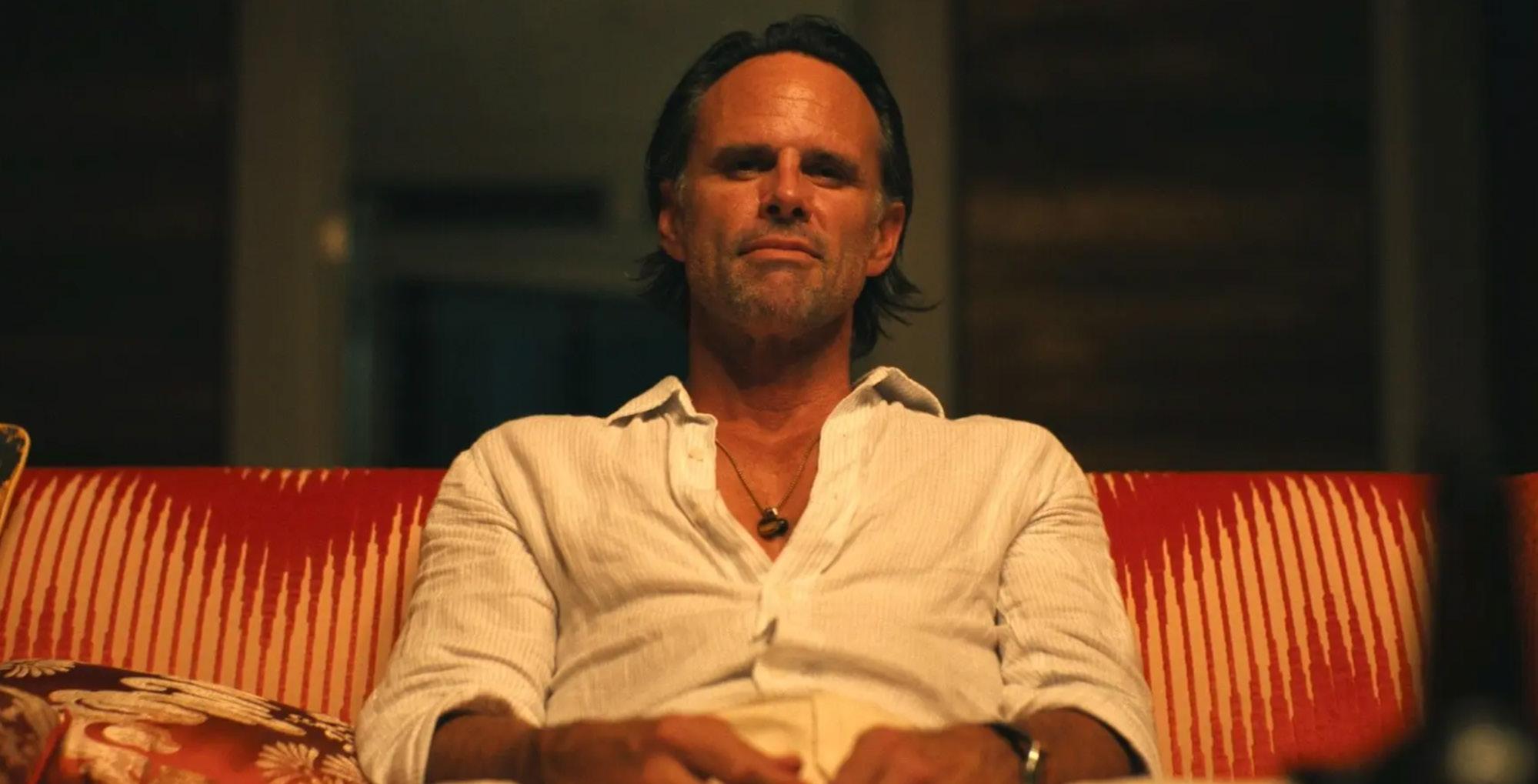
to join her messed-up family rather than run away. Saxton — enthralled in a novel — has decided to open himself up to a spiritual education rather than being all-knowing.
I would like to take a moment to examine the quote: “At this point in my life, I just don’t think that I was meant to live uncomfortably.” While dramatic, Peter Ratcliff may be the only person to read it as: let's kill my entire family then — from, of course, the seeds of three fruits. Ironically enough, the only child he meant to survive was the one who came closest to death.
Back to the threes: The other noticeable one is the best friends reuniting for a girls' trip. While there are some exceptions, if there’s one thing to take away from their vacation, it’s: two’s a party, three's a crowd. For the first few episodes, we watch as two women bond over a flaw of the third and then watch as it
7. Busiest airport in the world
8. Brain/spinal cord combo, abbr.
9. Backside
10. ___ constrictor
11. Web address
12. Widen, as pupils
13. Wide-eyed, awestruck
14. Yearning ones
16. Former football org that briefly relaunched in 2020
20. Fmr. quarterback Newton
21. Experiencing little to no romantic attraction, for short
22. Actor Lucy of "Kill Bill" and "Charlie's Angels"
24. Himalayan country
25. Something that a Wimpy Kid might write
26. Poker payment
28. Fmr. president Joe
29. A single time
31. Hit the heart button
32. Prefix with -clast
33. See the future with a crystal ball
35. Prefix with legal
39. Svalbard's country
40. Secure, fix
41. "Raw" and "SmackDown" org.
42. "What was __ _ was saying?" (2 words)
43. Hyping-up letters in a text
48. California valley
49. Right triangle part, abbr.
50. Shoe with wheel in it
51. Ripped
53. Britannica, e.g. (abbr.)
54. "Succession" family name
56. Ukraine, formerly
57. Speaker brand
58. Vienna's home, abbr.
59. Yankees legend Gehrig
60. Female bear, in Spanish
61. Soccer tie-breaker shots
61. Hank ___ , "Ant-Man" character in Marvel
subsequently happens to them the following evening.
The tension within this three woman show came to a head when they banded with, of course, three Russian men. While the crew spends one fun — however concerning — evening together, their true intentions are soon after revealed and Chelsea’s superstitions are, once again, reaffirmed.
Finally, the most shocking three come at the end of the finale when Rick starts a shootout that kills his father, his girlfriend and himself. After his season-long search for the man he claims ruined his life, Rick accidentally reunites with his father instead. While Jim Hollinger is responsible for abandoning his son, Rick’s unsatisfying life and ultimate death can be pinned on no one but himself. While he was searching for the love he never received as a child, he was unable to see the love
he was receiving as an adult.
While it was speculated that Belinda would be one of the dead after her son's panic in the opening shots of Episode 1, she walked out of the resort better off than anyone else. After two seasons of sacrifice and disappointment, it’s nice to see her get a win.
The most praised dialogue comes at dinner with Laurie, Jacklyn and Kate, when Laurie’s honesty is what breaks the superficial curtain of the group and brings them closer together. While Jacklyn and Kate reminisce on the successful trip, Kate is the only one to point out the reality of how it’s been for her. Her epiphany, “I don’t need religion or God to give my life meaning. Time gives it meaning,” demonstrates a transformation that neither of her friends endured over the week. In ending her speech with, “I’m glad you have a beautiful face, and I’m glad you have a beautiful life. I’m just happy to be at the table,” she is forsaking the competitive cycle they’ve found themselves in and choosing to accept her friends as they are. Still, I plead with Laurie to rethink these relationships when she returns to New York.
While everything wraps together nicely, the one thing out of place is Mook's flat character. Being one of the biggest stars in the show — known as Lisa, a K-pop sensation — her single storyline is out of place in the whirlwind of plot twists around her. The largest theory was that it would be revealed that she helped Valentin with the robbery. While this did not end up being the case, I predict that her appearance in seasons to come will give some depth to her inner story.
Contact Grace Schuringa at schugh24@wfu.edu